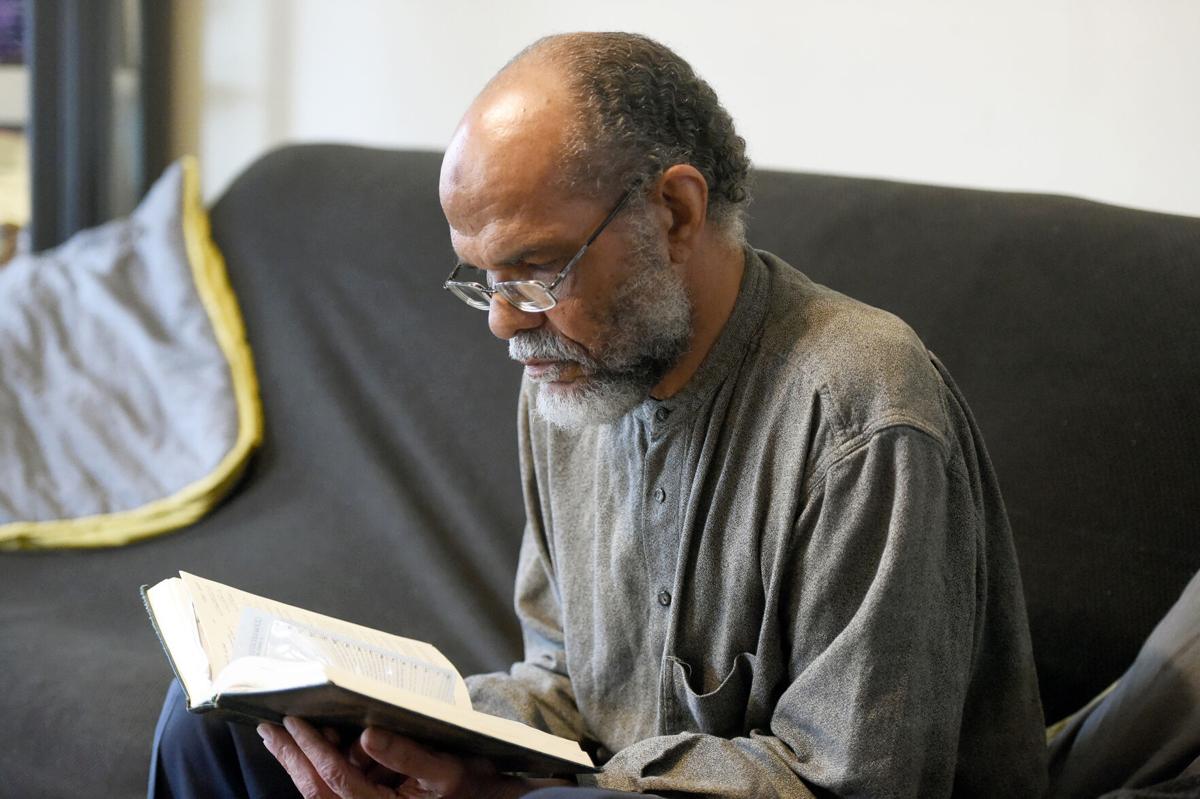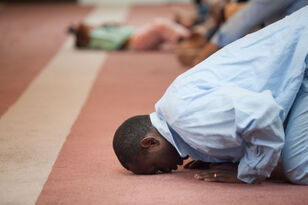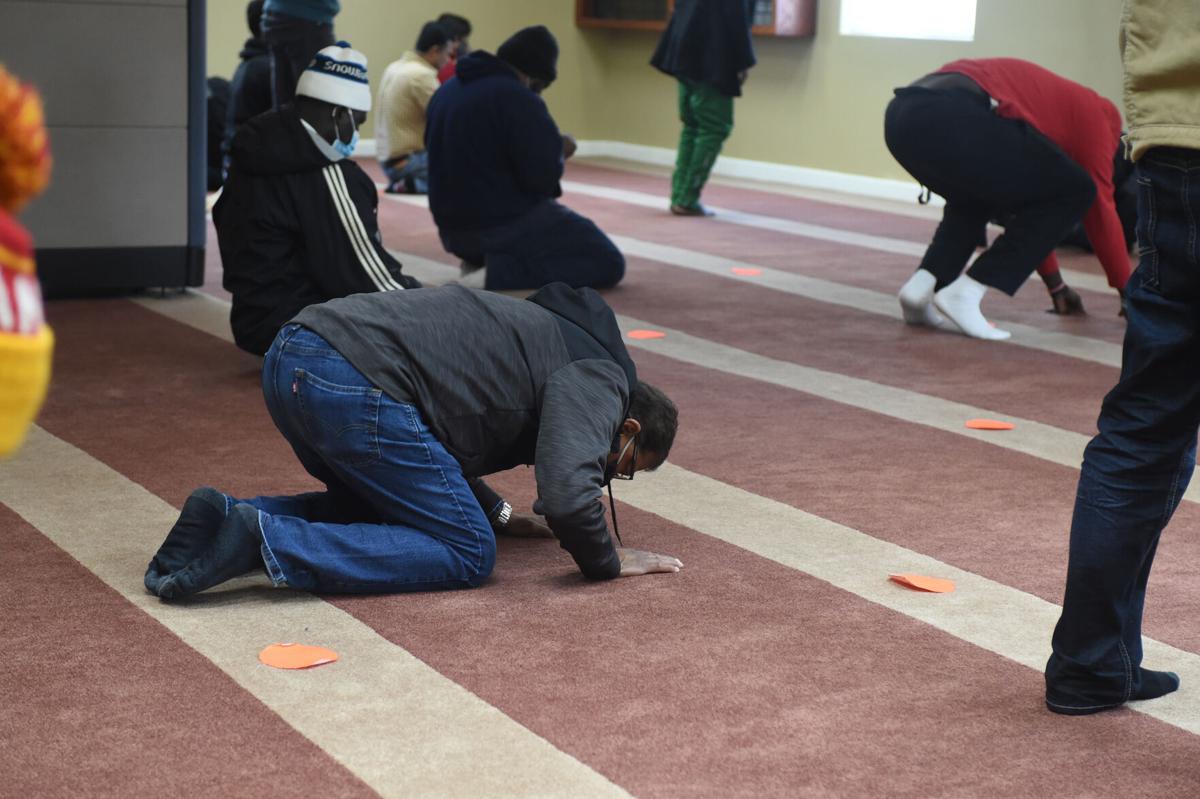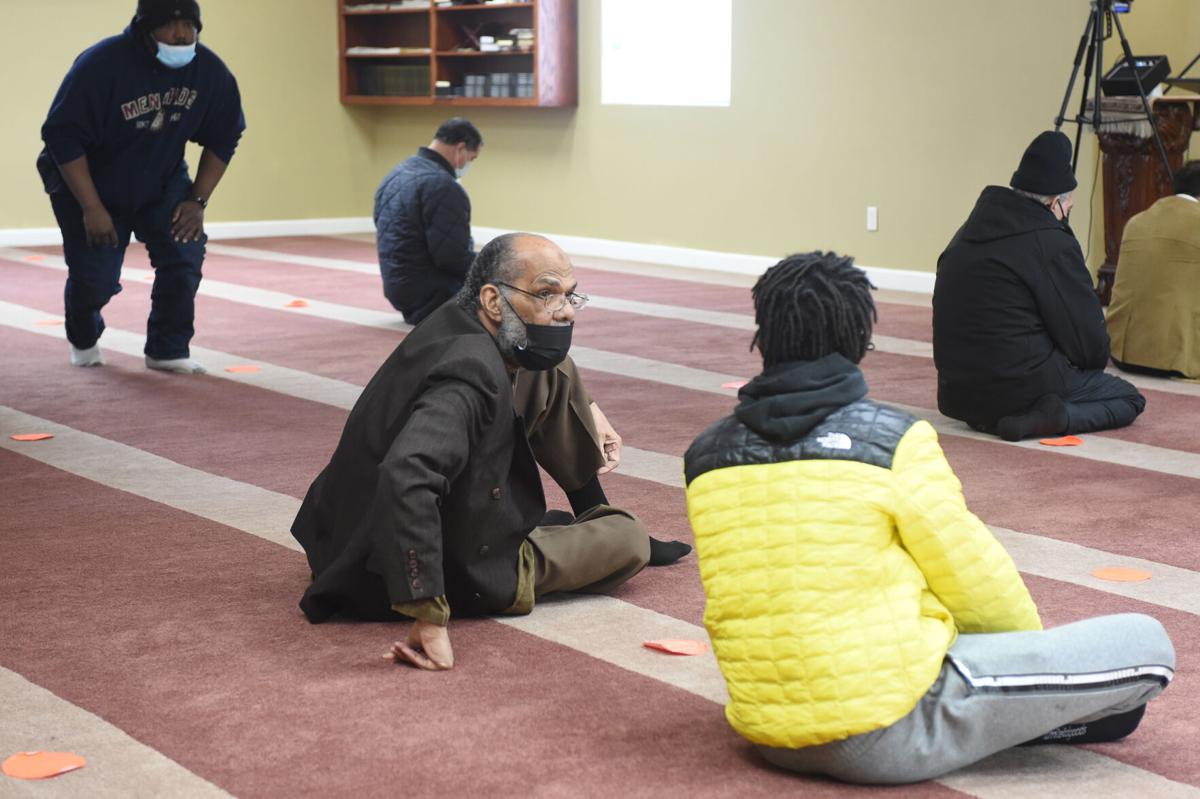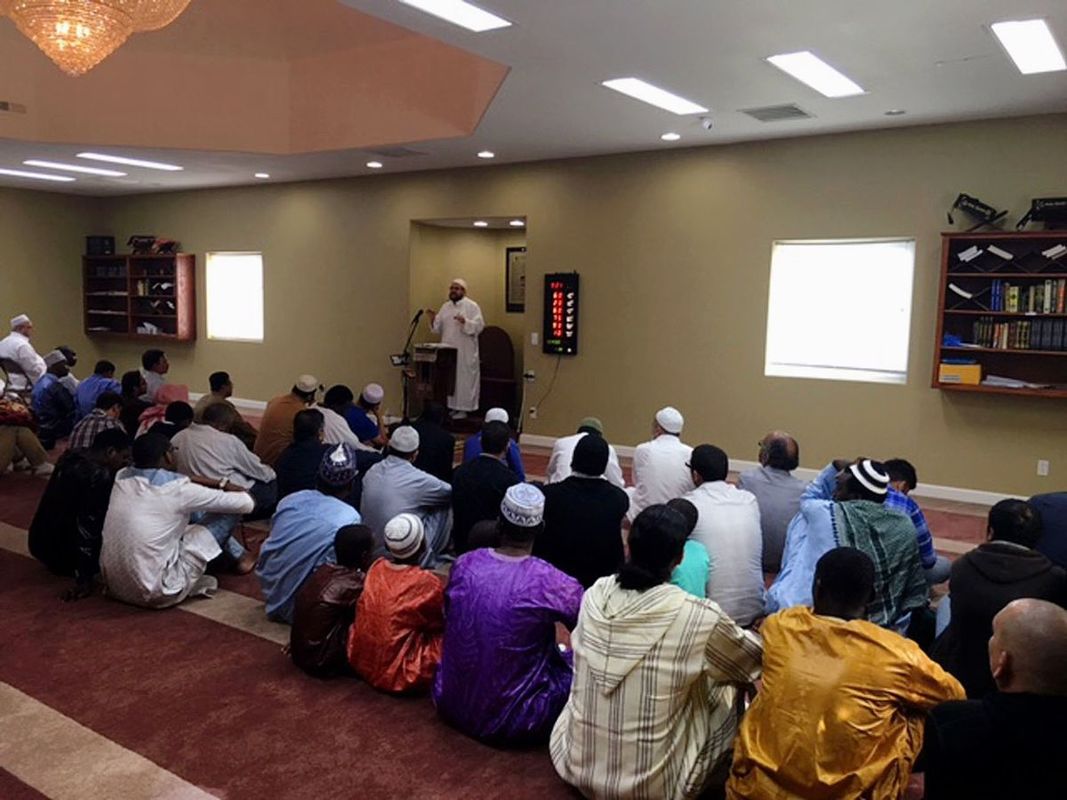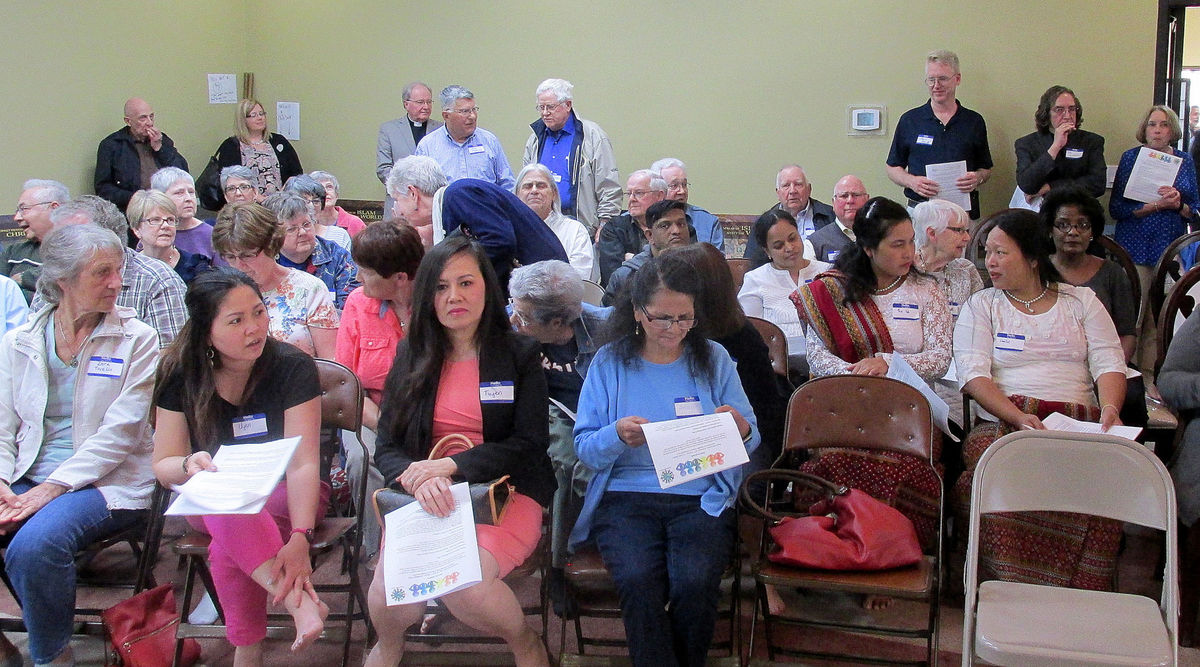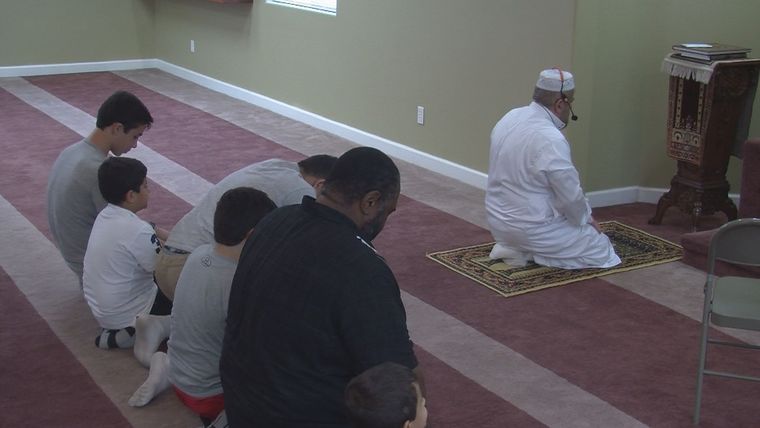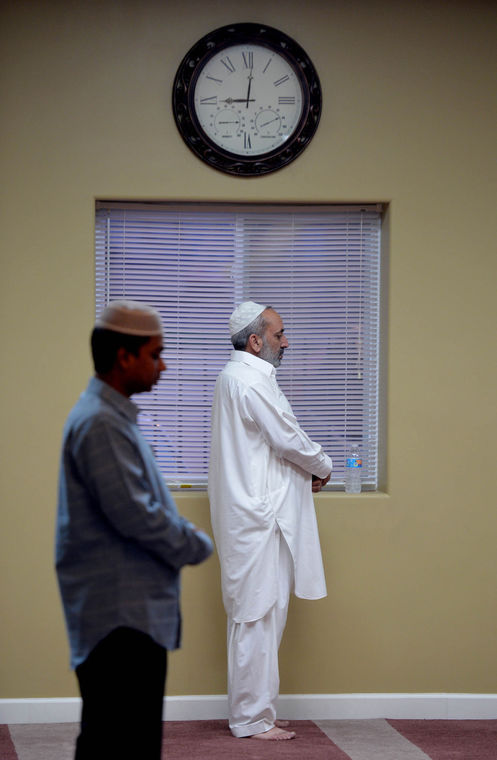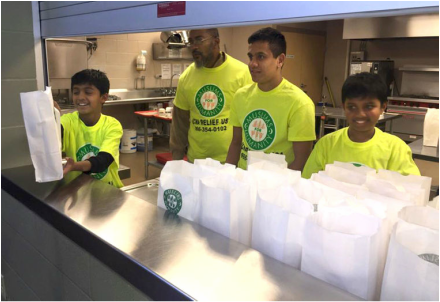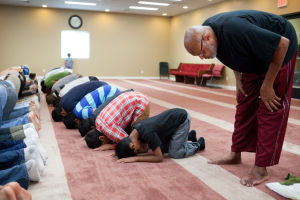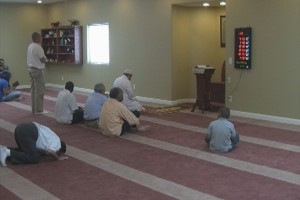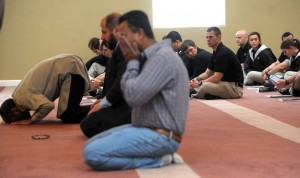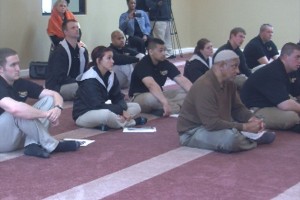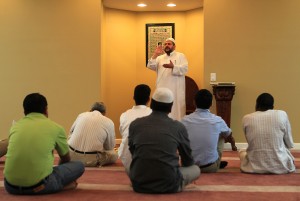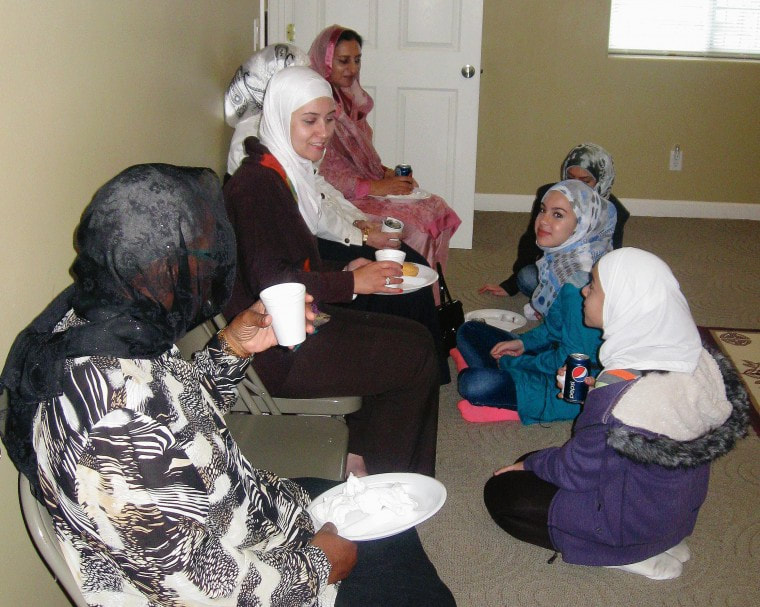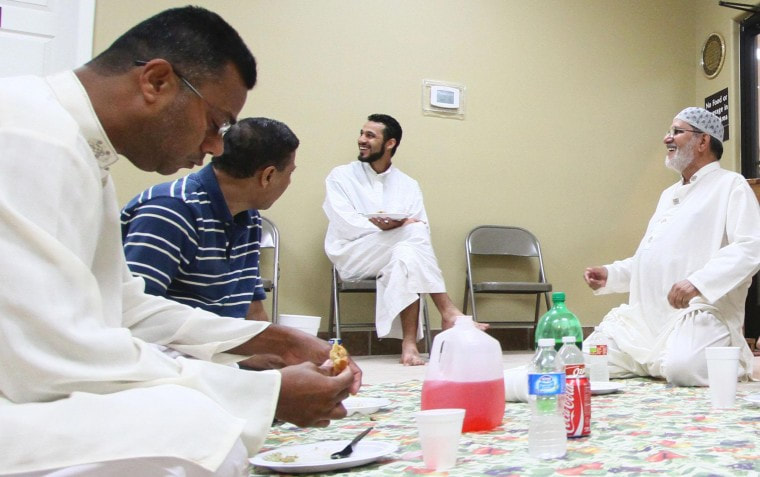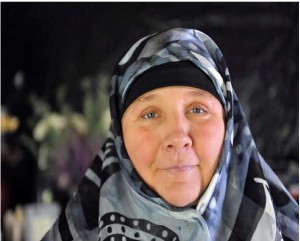Local congregations react to crisis
For more than 40 years, Ramadhan Washington has participated in the celebration of Ramadan.
“I’ve been fasting for over 40 years and I see the benefit. Not that I look forward to doing it every year because 30 days is rough,” he said, laughing.
Observed on the ninth month of the Islamic lunar calendar, Ramadan is a 30-day exercise in spiritual reflection and fasting. From dawn to dusk, Muslims are asked to refrain from activities like smoking, drinking, eating and sexual contact. This year, it will begin April 12.
Through fasting, Washington said, Muslims learn patience and perseverance, two aspects that he feels aren’t as celebrated in modern society.
“What the world needs now is self-restraint. Man has broken his ties with his creator and those commandments that govern man’s behavior,” Washington said. “All that’s thrown out the window because man doesn’t fast anymore. It’s just a passing fancy. But it has a purpose. It’s a divine thing.”
During the fast, Muslims are asked to pray five times a day. Some will come and populate the Islamic Center of St. Joseph, while others will worship from home.
Fasting for 30 days is no easy feat, Washington said, but with the longing and urges comes a sense of clarity.
“It’s going to be rough because those things, those habits, those urges, that’s what we bring under control. We bring on ‘nafs,’ which is the ‘soul self’ (in Islam),” Washington said.
Muslims with health conditions are asked not to fast, but rather to feed a person in need every day as a replacement.
With the Islamic Center of St. Joseph entering into its 10th year in the area, there’s been a decade of Ramadan being celebrated in a central location in St. Joseph. For the Muslim community, that’s a big deal, as Ramadan brings in people from all over to pray during the 30-day holy observance.
At the Islamic Center, one of the biggest nights will be Lailat al Qadr, also known as “The Night of Power,” a time within the final 10 days of Ramadan that marks the evening when the Qur’an was first revealed to the Prophet Muhammad by Allah.
“Usually Muslims retreat to the mosque and stay in the mosque all night. The Qur’an says ‘The Night of Power is better than 1,000 months.’ So we have to experience that,” Washington said.
In 2020, Washington said Ramadan felt a little different, as Muslims had to adjust their activities because of the coronavirus. While it was tough, they made it through to a time when COVID-19 numbers are down and thankfully, Washington said, members of the Muslim community have been able to gather without any illnesses.
As Muslims in the area enter into Ramadan, Washington said it will be a time of thankfulness and spiritual cleansing that likely will last long after 30 days.
“We enhance our spiritual worship. We’re fasting, we pray more, we give more charity, we do more good deeds. Why? To win the pleasure of Allah,” he said.
As Muslims prepare for the month, Washington said it’s nothing less than a beautiful thing.
“It’s a blessing. If it wasn’t a blessing, Muslims from all over the world wouldn’t be doing it,” he said.
Members of the Islamic Center of St. Joseph meet every Friday for the Khutbah (sermon) at 1 p.m. and at 1:30 p.m. for the Iqama (Jumu’ah prayer).
Andrew Gaug can be reached at [email protected].
Follow him on Twitter: @NPNOWGaug
Courtesy: St. Joseph News-Press
The work is often tireless. If there’s a summit of religious leaders, chances are Washington is there talking to people about Islam.
“We have had much, much, much dialogue with this community. I’ve had the opportunity to speak and read at just about every church here,” he said.
The rewards from the work include an understanding and respect in the community that tears down misconceptions in the media, TV and movies.
“We’re not going to change each other. We’re in America. So many people out there don’t even believe in God at all. So we believe every person has the right to believe — in peace — what they believe in,” Nabil said.
It’s a philosophy that has worked for the Islamic Center. Its leaders said that they are looking to expand beyond the property. During the past year, they bought property on K Highway to serve as a proper place for Islamic burials. Because Muslims believe in preserving the body and making sure it’s buried immediately, that doesn’t always work well with traditional funeral businesses.
“We do not wait, three, four days, even two days. Like, my mother-in-law, she died in the morning and we buried her before the sunset. That’s why we need a place to wash the body and do the ceremony,” Nazar said.
The center’s leaders said more details about the cemetery will be released in the spring.
While the center is entering into its 10th year, it won’t hold a celebration. Rather, it will continue to do to worship with the knowledge that the work that they’ve done is reaching others in the area and there’s still more to do.
“The message of Islam started in such a little tiny place. It’s not about how fancy it can be, it’s about the message itself. The whole purpose was just to serve our community, Muslim community, when it comes to pray, and when it comes to many other needs,” Nabil said.
Courtesy: St. Joseph News-Press

Local Muslims celebrate Eid holiday
By Nathan Ellgren
News-Press Now
Sep 1, 2017
About 100 Muslims from the region packed into the Islamic Center of St. Joseph on Friday to celebrate one of their faith’s most important holidays: Eid-al-Adha.
It coincides with one of the largest annual gatherings of people in the world, when Muslims make the hajj, or pilgrimage, to the Grand Mosque in Mecca, Saudi Arabia.
It’s a mandatory religious duty for Muslims to travel to the holy city at least once in their lifetime, and 3 million pilgrims made the journey this year.
Ayman Hassan, the leader at the Islamic Center of St. Joseph, said that he fulfilled hajj twice in the 1980s.
“You can’t imagine the spirituality that I was experiencing when I was in Mecca and Mina,” Hassan said. “It’s where Abraham, his wife Sarai, his son Ishmael and all their offspring used to live, and I really experienced the same spirituality that they were experiencing.”
Hassan added that many people wear white as a symbol of equality regardless of nationality, skin color or financial standing.
“It is a sign of unity,” he said. “In such white color uniform, you never recognize or figure out the wealthy from the poor, the arrogant from the humble, you can see all of them as one body, united, no difference between any two of them.”
Those who are unable to travel to Mecca still can celebrate from home, and many were fasting from sunrise to sunset Thursday to celebrate the Day of Arafat.
The local group of Muslims began their Eid-al-Adha celebration Friday morning by praying toward Mecca at the center. Then, families went home to slaughter a sacrificial animal, which honors a common monotheist story of Abraham’s willingness to sacrifice his son as an act of obedience to God’s command.
“According to the way of the prophet Muhammad, we should divide the sacrificial animal after slaughtering into three-thirds,” Hassan said. “One-third for the poor and needy and this is the most important one, the second third to our neighbors, either Muslims or non-Muslims, but the closest, and third for the family members’ dinner.”
By Andrew Gaug
News-Press Now
April 10, 2021
Hassan’s son Mostafa, who’s in fifth grade, sees Eid as a time to connect with family and friends, and that it’s similar to Christmas when adults give kids prizes and money.
“As a kid experience, it’s about having a good time basically,” he said. “On Eid, you should be happy; there is no reason to be sad or anything.”
The conclusion of hajj also symbolizes a rebirth and is an opportunity for Muslims to have sins forgiven so they can start a new chapter.
Mostafa said that he’s looking forward to making the trip to Mecca in the future.
“It’s a beautiful place over there,” he said. “I would be really happy to be around Muslims and be proud of my religion.”
Courtesy: St. Joseph News-Press

Interfaith Alliance celebrates diversity
More than 100 people of all faiths and nationalities gathered on Wednesday evening inside the Islamic Center at 2325 Messanie St. for the annual Prayerful Gathering.
The gathering, hosted by the Interfaith Alliance for Immigrants, is intended to show people from all walks of faith and ethnicity how much we all have in common, explained Father Ron Will of St. Francis Catholic Church.
“Our purpose is to raise awareness, appreciation and value of every human person, and sometimes immigrants are looked down upon and seen as a problem.
We’re trying to celebrate them as a gift to the community, and just realize we’re all immigrants to this country,” he said.
The audience listened to songs and readings from from several different faith traditions. The gathering also got to hear guest speaker Juan Martinez speak about his journey from Mexico to the United States, and how he hasn’t seen his family in several years.
“Pray for the immigrants and everything, not only for myself but everybody, because Jesus loves everybody,” Martinez said.
Dr. Ali Kamali also talked about his experiences as a Muslim Iranian living in Northwest Missouri.
After the event, the audience was treated to a feast of foods and desserts from other cultures and countries.
Terry Turbak attended the gathering because she felt the community needs to celebrate all the diversity here in the city.
“I’m here to learn more about other cultures than my own, and hope to meet people from different cultures and make friends,” Turbak said.

By Kristina Zagame | [email protected]
Published 02/01/2017 09:50AM
ST. JOSEPH, Mo. – President Trump’s executive order that barred immigration from seven Muslim-majority countries has instilled a new fear in Muslims across the country.
But members from the Islamic Center of St. Joseph said they have been shown compassion and support from the community.
Aljedaani Adel said he on his way into the mosque on Sunday for prayer when he found a bouquet of flowers in front of the door.
“It made me proud to be a part of this town,” said Adel. “Things are being treated differently, especially towards Muslims. However, this town showed us love, this town didn’t show us ignorance, this town didn’t show us any sign of hatred.”
Adel said other members of the community have reached out to the center about holding a support rally for Muslims in St. Joseph. They will be holding a rally on Saturday at 3 p.m. at the Islamic Center of St. Joseph.
Adel posted a picture of the flowers on social media and on the center’s website to thank the anonymous gift-giver. He said he would love the chance to thank them in person.
Adel recently graduated from Missouri Western State University and is currently employed there, living in St. Joseph with a work visa. Although his home country of Saudi Arabia isn’t currently on Trump’s travel ban list, he said he worries for what is to come.
“I’m afraid that in the future, the law will change and I will lose my opportunity of working in the United States, said Adel. “Or even, I was thinking about finishing another degree in the U.S., So that might effect my future as well.”
Other members of the center said they are concerned that the ban will further the false association of the word “terrorism” with Muslims.
Courtesy: KQ2 – The St. Joseph Channel
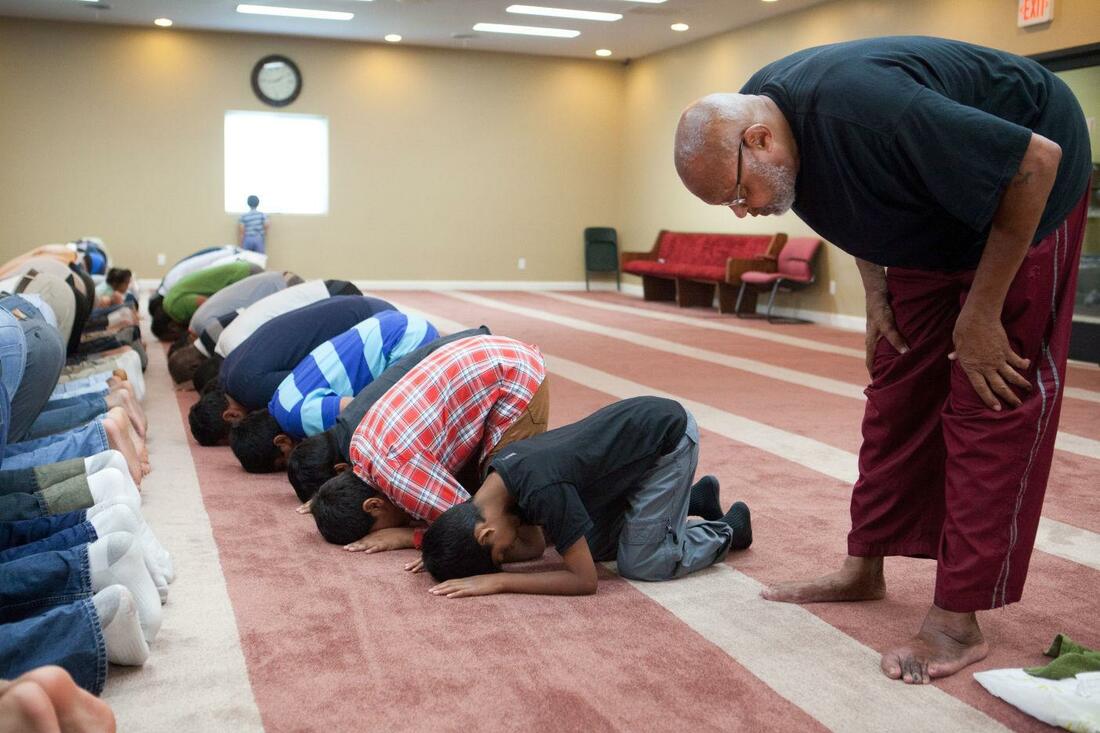
As Central High School closed out its school year, Charles Triplett helped students stand against racism.
Interacting with students at Central and other high schools is just one way the 72-year-old contributes to the community. He spends his days delivering sheets to St. Joseph Haven, helping out at the Islamic Center of St. Joseph, where he also worships, and educating students about racism.
“And racism is within your own race. It’s in no one particular race,” Mr. Triplett said to students over the booming noise of a lunchroom. “So if you’re against racism, stand up and eat and go over there and sign that pennant.”
Given his community involvement, most never would guess that Mr. Triplett spent 57 years in prison. He’s spent time in four different states’ penal systems, spending most of his time in Jefferson City. He was one of the first people in Missouri to be sentenced to life for armed criminal action.
Mr. Triplett has a unique perspective on the penal and justice systems. He said there are police and corrections officers who care about inmates or, in the case of police officers, the community. While working with students, he said he wants to educate them on their rights and offer this bit of advice: Treat police officers with respect.
“They’re just human beings,” Mr. Triplett said. “You’ve got some that care about people and a lot of times, those good officers that care about people, they move them around.”
He said the prison system isn’t perfect, noting that it is a multi-billion dollar industry. He said he believes one way to fix criminal problems in society is to use reformed inmates, like himself, to educate young people on the realities of crime and prison.
“Movies portray a person as a criminal as being hard and you look up to them,” Mr. Triplett said. “I think that’s the wrong portrait you should put of a person because when you locked up it changes your life. You locked up.”
He isn’t ashamed of his past, freely admitting to students that he was a crook, but he isn’t exactly proud of it either. While he was in prison he fought with guards, but eventually found ways to contribute and educate himself. He believes in the proverb that knowledge is power.
“Even though I went to prison (and) I committed a crime, I can’t take back what I did,” he said. “I can make sure that other young people don’t look at me as no hero, but look at me as a person who changed my life for the betterment because in actuality as long as I stayed in prison it probably saved my life cause I was pretty wild.”
When he was released in 2007, Mr. Triplett had to prove his existence, tracking down family records to obtain a Social Security card and ID. The transition from prison wasn’t easy and it took two years for him to buy a car. Regardless, he knew he had one mission: To give back to the community and do as much good as possible.
“You know, the badge of honor is staying out of prison and making sure your kids don’t go to prison,” Mr. Triplett said. “You know the education, man, is supposed to help you do this here.”
Dave Hon can be reached at [email protected]. Follow him on Twitter: @SJNPHon.
ST. JOSEPH, Mo. – As many ramp up their anti-Islam rhetoric in response to recent terror attacks, local Muslim’s say they are looking for people to see the real truth in their religion.
“As Muslims, we are peacemakers, said Ramadhan Washington of the Islamic Center of St. Joseph. “We are people of peace.”
This comes after President Obama made an Oval Office address Sunday night to the nation asking for tolerance.
“Our success won’t depend on tough talk or abandoning our values or giving in to our fear,” Obama said.. “Muslim-Americans are our friends and our neighbors, our co-workers, our sports heroes, and yes, the men and women in uniform who are willing to die in the defense of our country.”
“Our success won’t depend on tough talk or abandoning our values or giving in to our fear,” Obama said.. “Muslim-Americans are our friends and our neighbors, our co-workers, our sports heroes, and yes, the men and women in uniform who are willing to die in the defense of our country.”
The mass shooting in San Bernardino last week by two Muslims has focused increased scrutiny on the religion by many. The President’s speech was meant to address fears.
Local Muslims like Washington says the recent violence is the extremism of evil people hiding behind religion.
“I’m not saying so called Muslims have not committed horrific acts or violence against Christians or other people in other countries,” Washington said. “What I am saying is that I know that is not Islam.”
Washington and Islamic Center member Charles Mujihad Triplett want others to understand their belief that Islam has more in common with other religions than it does differences.
“We might have a little contradiction or a little pause that separates us, but we all believe that thou shalt not kill and thou shalt not steal, honor thy father and mother,” Triplett said.
Both say that educating others on the true meaning of Islam will help bridge understanding. They also grieve for the victims of violence committed in the name of Islam.
“They will be the ones in paradise,” Washington said. “They are the martyrs, not the ones who committed such a horrific act.”
Washington and Triplett both say the Islamic Center works well with other faiths locally. They add that they often give presentations to other groups to help better foster a better understanding of their religion.
Courtesy: KQ2 – The St. Joseph Channel
Celebration marks end of Ramadan
By Mason Marshall | St. Joseph News-Press July 17, 2015
On Friday, the Islamic community in St. Joseph came together to celebrate Eid al-Fitr, marking the end of the monthlong fast of Ramadan.
In Islam, fasting is an act of deep personal worship. During Ramadan, Muslims fast from food, drink and sexual contact from dawn to sunset. It is meant to be a spiritual journey for the community, which means members also fast from sins.
“We fast from eating, drinking and passion. … And spiritually, we fast from sins, like the habitual sins that we do on a daily basis, just like any other human beings who do daily sins,” said Imam Ayman Hassan of The Islamic Center of St. Joseph. “For example, it is prohibited to lie, cuss at others and fight others. As human beings, we forget, we do sins on a daily basis that might affect our faith.”
During Ramadan, adherents also work to be a better person and strengthen their community by doing good deeds to those who need it.
“We do lots of acts of worship in addition to fasting, like praying or doing good deeds, like paying charities,” said Imam Hassan. “It’s actually a month worship, and when we say worship in Islam, it means either the obligatory acts of worship or the voluntary acts of worship.”
The end of Ramadan is celebrated with Eid al-Fitr. The celebration is marked with socializing, festive meals and modest gift-giving, especially to children. It also is the day to ask forgiveness of sins committed prior to Ramadan.
Following Ramadan is meant to have an impact on day-to-day life after fasting, as well.
“… If we fast so perfectly and precisely,” Imam Hassan said, “it means that after Ramadan, we’ll be more habitual and consistent about what we did in Ramadan.”
Eid al-Fitr is celebrated worldwide by the Islamic community.
Mason Marshall can be reached at [email protected]
Courtesy: St. Joseph News-Press
Ramadan is a holy observance in the Muslim worldwide faith community. Observed on the ninth month of the Islamic lunar calendar it is a 30-day exercise in spiritual reflection and fasting. It also is a time to cleanse your body, mind and spirit, said Mr. Triplett, the center’s senior adviser.
“In the fasting process we abstain ourselves from cursing, getting angry, we try to do charitable work, we also stay away from argumentative conversations,” Mr, Triplett said.
Fasting is done as an act of worship and obedience to Allah for 30 days. Between dawn and sunset, Muslims forgo food, drink and sexual contact.
However, Muslims who are on medication or suffer an illness that prevents them from fasting are excused from the practice. In place of fasting, they must feed a needy person for every day of fasting missed.
“Ramadan is good for everybody, matter of fact a lot of religions fast, every religion has some type of fast,” Mr. Triplett said.
Since the new day in Islamic culture begins at sundown, Ramadan began Wednesday evening. Every night the fast is broken at sunset with prayers and a meal, said Ramadhan Washington, president of the Islamic Center.
“The prayers started last night, fasting started this morning,” Mr. Washington said Thursday. “Once the sun comes up, then we start fasting. The fast doesn’t come until after the morning prayer or the crack of dawn.”
A lighted board on a wall inside the Islamic Center shows the five times a day Muslims should pray.
Thursday at 8:51 p.m., the St. Joseph Muslim community broke the first fast of Ramadan with a prayer and a meal provided by Gyro Paradise.
Mr. Washington changed his name to Ramadhan more than 40 years ago when he joined the faith. He liked the name, which is slightly different from the Ramadan observance spelling because it stands for protection. Ramadan comes from the Arabic word Ramdhi, which is a swaddling for the feet of camels to protect them from the desert heat, he said.
“Ramadan is called the hot month. Ramadan is a protection, spiritually speaking, where we fast and are under the protection of Allah,” Mr. Washington said.
Alonzo Weston can be reached at [email protected].
Source: St. Joseph News-Press

Islamic Center gives back with monthly meals
By Alonzo Weston | St. Joseph News-Press May 26, 2015
Feeding the hungry is a noble mission for any faith. The Islamic Center of St. Joseph saw it as its mission to tend to the needs of the hungry and homeless.
The first Friday of every month, members of the center feed the hungry at the Safe Haven. It’s part of a nationwide mission of the Islamic Circle of North America Relief USA program (ICNA). Its mission is to serve the needy in a number of charitable areas.
Imam Ayman Hassan is outreach coordinator for the local endeavor.
“It’s to show the genuine face of Islam, contrary to the Islamophobia in America. Actually, all these activities are reflected in verses in the noble Quran,” Imam Hassan said.
He added that members of the The Islamic Center of St. Joseph congregation donate for the cause after the Friday service. The members have been feeding the hungry and homeless every month since January.
“We ask the congregation to donate to that noble action and all of them know that feeding the hungry is a must. All of them, without exception, donate for such activity,” Imam Hassan said.
Saleem Michael Andres, head of the ICNA team in St. Joseph, said they serve meals for roughly 60 people. It is a ministry and a obligation of his faith, he said.
“We’re not going out and preaching about Islam. It’s just a charity. That is obligatory for us in Islam, for us to reach out to the poor and the needy, to try and support them the best that we can,” Mr. Andres said.
Mr. Andres said he hopes in the future to expand the program to provide other services and reach other needs in the community.
“In the future, I hope to get some of the sisters involved for like the YWCA and trying to do something on a monthly basis for them and looking for more activities to help out with the community,” Mr. Andres said.
Dave Howery, director of InterServ, said the support the organization receives from the faith community is extremely important. And by faith community, he said he means support from service clubs, individuals and families as well.
“It’s an opportunity for them to express their faith and carry out their spiritual teachings initiative and it’s also a chance for us to benefit from that,” Mr. Howery said.
Alonzo Weston can be reached at [email protected]. Follow him on Twitter: @SJNPWeston.
Source: The St. Joseph News-Press

Muslim celebration of Ramadan starts Saturday
By Jena Sauber | St. Joseph News-Press June 27, 2014
Today marks the first full day of Ramadan, the Islamic holy month of fasting as an act of refocused worship and religious obedience.
“As you know, everyone is busy with their family, with their business,” said Ayman Hassan, leader of prayers at the Islamic Center of St. Joseph. “Out of His mercy, the Almighty God has specified Ramadan out of a reminder for Muslims to focus on their acts of worships, to be reminded that this world is not permanent.”
The act of fasting during Ramadan, or abstaining from food and drink between sunup and sundown, helps people focus on worship instead of worldly things, Mr. Hassan said. Ramadan also calls for refraining from smoking and sex, as well as a good-faith effort to abstain from unclean thoughts or actions such as lying or gossiping.
A main goal of Ramadan is the Islamic concept of “taqwa,” which Mr. Hassan described as “piety” or being “God fearing.”
“This is the main goal because when we get hungry, when we get thirsty, we think about the poor and needy. We think about each other and supporting each other,” he said. “We get closer to the Almighty God and think about the hereafter.”
Not all Muslims are obligated to participate in Ramadan. Exceptions are made for those who are traveling, sick, pregnant, breast-feeding or have not yet reached puberty. If people are unable to fast during Ramadan, they can fast during another time of the year. Feeding the hungry is an acceptable substitute for those with chronic illnesses or who are otherwise unable to fast in the future.
Zakariae Ainouch, who moved to St. Joseph from Morocco in 2011, said that Ramadan is a very spiritually fulfilling time.
“When Ramadan comes up, every Muslim waits for that. There is a lot of forgiveness, a lot of reward. There is more of a connection with God because the environment pushes you to worship God more than usual,” he said.
Laylatul Qadr, or the “Night of Power,” occurs during one of the last 10 days of Ramadan, although the exact date is unknown. It is believed that the night of Laylatul Qadr was when the Quran was revealed to the prophet Mohammed.
“Anything you ask Allah, He accepts this one night,” said Nahla Ahmead. “You never know when it will occur, so each day you make sure you pray to Allah on what you want and need every night.”
Ramadan lasts for approximately 30 days. Because its timing is based on astrology, the exact start and end dates of Ramadan vary slightly around the world. The end of Ramadan is marked with the celebration of Eid al-Fitr, a time for praying, feasts, gift-giving, charity and other acts of celebration.
“All of us are very, very happy. We have been waiting for this,” Ms. Ahmead said. “My heart is happy because when we are fasting, we are near God.”
Jena Sauber can be reached at [email protected].
Source: The St. Joseph News-Press

(ST. JOSEPH, Mo.) Muslims in St. Joseph are preparing to observe Ramadan. The Islamic Center of St. Joseph will join more than one billion Muslims around the world who will observe the month long period.Ramadan is a time when Muslims take part in self-reflection to renew their faith, charity and fasting.
“When you fast, you have both physical as well as physical healing and becoming a good human being. You can take into account the miseries of other people,” said Dr. Emad Khan.This is the fourth year for Ramadan at the Islamic Center of St. Joseph. Ramadan begins Saturday.
Source: KQ2

Muslims seek understanding with police
By Andrae Hannon | FOX 26 KNPN April 7, 2014
Cadets from the Missouri Western State University Law Enforcement Academy gathered Monday at the Islamic Center of St. Joseph to learn about the Muslim community they serve.
“What we’re doing is we’re getting them prepared for if they’ve never been around a Muslim and we just happened to be the only Islamic center in the whole Midland area,” said Charles Triplett of the Islamic Center of St. Joseph. “So we’re no different than any other religion but our main thing is to get these young cadets familiar with being around a Muslim.”
The seminar’s guest speaker was Jabir Hazziez Jr. of the Jackson County Sheriff’s Department. A few years ago he was recognized in Kansas City for his heroism during a mid-flight crisis. He spoke about Islamic culture, Muslims in America and answered questions.
“Well it’s basically so they can have an understanding of the community which they serve,” Mr. Hazziez said. “Whether it’s white, black, Hispanic, Jew, Christian, Muslim, you want to understand the community that you are serving. And perhaps even have that community represented on your force.”
Mr. Hazziez says that for some time the Muslim community of Kansas City has reached out to law enforcement. He hopes the same will be done in St. Joseph.
“Whether it’s domestic terrorism, international terrorism or crime in the community. So this is nothing new. I think this is the first time that the Islamic Center of St. Joseph has embarked on this,” Mr. Hazziez said.
While Muslims respect the laws of the land, there is a mutual respect they wish to have among law enforcement officials.
“We have our religious rights and we want them to be respected because we respect a person, a law with authority. We respect them,” Mr. Triplett said. “But respecting them means they have to respect when they come into our house of worship. When you go into a Muslim home you take your shoes off. The house is set up different. You don’t see a lot of pictures and stuff.”
Andrae Hannon can be reached at [email protected].
Source: The St. Joseph News-Press

April 7, 2014
(ST. JOSEPH, Mo.) Eighteen cadets from the Law Enforcement Academy visited the Islamic Center of St. Joseph to get a better understanding of the Muslim community.
The Islamic Center wants cadets and future law enforcement officers to know that they’re here to help their community.
“We’re getting them prepared for if they’ve never been around a Muslim,” said Charles Mujihad Triplett.
Triplett says it’s important that officers respect their religion as they respect authorities. He says they want the public to know that they believe in helping others despite a negative view some have of their religion.
“Dawah means that we intertwine with the Catholics charity. We work with Baptist and different denominations. We also work with Interserv and YWCA,” added Triplett.
Leaders of the academy at Missouri Western State University say it’s important that cadets be exposed to all parts of their community.
They believe officers can’t serve properly, unless they get to know their surroundings.
“I think it’s important they understand not only the cultures they’re familiar with but other cultures as well because we live together and we have to deal with each other,” said Kip Wilson from Missouri Western State University’s academy.
Wilson hopes cadets will take something from Monday’s exercise when dealing with other cultures.
“I just hope that we learn better to communicate better with people who have different values and beliefs than we do and how to better serve the society as a whole,” added Wilson.
The Islamic Center added that this training event is something they do each year.
Source: KQ2
Ramadhan Washington
President of the Islamic Center of St. Joseph
February 2014
It stands to reason that Christians, who we call Christians because of their unique relationship to Christ, stake ownership of Jesus Christ. However, Muslims seek co-ownership.
No other prophet, not even Islam’s founder Muhammad, is mentioned more times in the Qur’an than Jesus. Amongst the nearly 124,000 prophets that Muslims believe have been sent to earth since the dawn of time, Jesus is considered second only to Muhammad. We believe he was a precursor to Muhammad.
Since the two largest faiths on earth have such a unifying figure central to their beliefs, why does a misperception persist that Jesus and his teachings are somehow against the doctrines of Islam?
Two events in the life of the prophet Muhammad may help explain why Muslims revere the Christian Jesus.
It may come as a shock that it was a Christian who first verified Muhammad’s role as a prophet.
When Muhammad received word at age 40 that he was to be a prophet, he was deeply troubled and agitated – to the point of contemplating suicide. His worried wife took him to her elderly uncle in Mecca named Waraqa. He was a Christian.
Muhammad recounted his encounter with the angel Gabriel who had appeared to him while he was mediating in a cave. Muhammad thought he was possessed. Warqa told him that he was not.
“What you have heard is the voice of the same spiritual messenger God sent to Moses. I wish I could be a young man when you become a prophet! I would like to be alive when your own people expel you.”
“Will they expel me?” Muhammad asked.
“Yes,” the old man said. “No one has ever brought his people the news you bring without meeting hostility. If I live to see the day, I will support you.”
Warqa confirmed his prophethood, but he did not convert to Islam nor did other Christians living in Mecca – although some did. Such was the freedom and reverence that Muhammad had for the followers of Christ.
Another example of Muhammad’s reverence to Christians had to do with a Christian king in Africa named King Negus. He had heard about the new religion of Islam, and he viewed Muhammad as a natural line of prophets that God had sent. He provided shelter to early oppressed Muslims seeking refuge, and he told his people that between Christians and Muslims he could not “make out more difference than the thickness of a twig.”
The terrorism and violence that we read about today by so-called Muslims against Christian minorities in Muslim-majority countries and in other parts of the world are a deep departure from the teachings of Muhammad.
Yes, Muslims reject the divinity and crucifixion of Christ. Like Christians, we believe that will return again and bring with him a much needed peace and reconciliation to the earth.
We venerate Jesus – not only for his teachings but for his many miracles. Our shared interest in his message should be meant to unify us instead of divide us.
Source: The Regular Joe (February 2014 Issue)
Jesus a prophet for Muslims, too
St. Joseph News-Press
December 27, 2013
Inherent in the confusion surrounding this question is a misunderstanding that Muslims view Jesus as anything less than a great prophet and messiah. This Christmas season, let’s set the record straight.
Muslims revere Jesus and believe in the miracle of his virgin birth, just like Adam was created by God without a father or mother. Islam’s holy book, the Qur’an, describes Jesus’ conception and birth as well his many other miracles like speaking from the cradle and healing the sick and blind.
So profound and important was his message that Jesus is mentioned more times — in 25 different verses — in the Qur’an than Muhammad, the founder of Islam.
The departure in our belief from Christianity is that we believe Jesus was like all of God’s other messengers like Moses and Muhammad, and, in the end, a human being. His mother Mary also is viewed by many Muslim scholars as a saintly prophet. An entire chapter in the Qur’an is devoted to her.
The fact is that we have more in common than you might think.
As a Muslim, I have come to appreciate Jesus in my mind, heart and spiritual consciousness, even though I do not worship him as God or part of the Godhood or Trinity, like I had before accepting Islam many decades ago.
So the question I ask during this Christmas season of heightened devotion and friendship is: Does Islam’s version of Christ serve as a source of tension or as a means to bridge gaps between the world’s two largest faiths?
I am certain of the latter.
Though we do not observe Christmas as the coming of God to the world in human form, we do commemorate this brotherly season as a time to remember Jesus’ legacy as part of our shared religious heritage with Christians.
Sermons this month at mosques like ours around the country have used this holiday to remind the congregation about the special place in Islam for Jesus, a man who spoke to common people in universal terms, and who Muslims have cherished and venerated for over 14 centuries.
We are also reminded to say “peace be upon him” after Jesus and the names of other prophets as a form of respect towards the thousands of prophets God sent to earth, each reaffirming the message of the former and finally sealed by Muhammad.
In this season of heightened sharing and friendship, we hope our neighbors will visit our mosque, observe our services, and see that we are not that different. To arrange a visit and a tour, please visit stjoemuslims.org.
Ramadhan Washington is president of the Islamic Center of St. Joseph.
Source: The St. Joseph News-Press

Muslims close Ramadan
By Christian Johansen | FOX 26 KNPN
August 8, 2013
Thursday was a day of celebration for Muslims all over the world. Called “Eid al-fitr,” it marks the day after Ramadan.
Ramadan is observed as a holy time during the ninth month of the Islamic calendar. During the time, Muslims fast from sunrise to sunset during this lunar cycle.
Men, women and children prayed in colorful attire from across the Muslim world, including St. Joseph’s Islamic Center.
The Islamic Center has been open for three years.
Dr. Emad Khan said Ramadan is about cleansing the body and soul.
“By fasting, we learn to basically find out how people who have no access to food or drink feel,” Dr. Khan said.
“The whole idea is to purify your soul to the point that you are just so honest to your Creator to the point of just making it such a beautiful, surreal relationship with Allah.
The next Muslim holiday is the yearly pilgrimage to Mecca in Saudi Arabia.
Christian Johansen can be reached at [email protected].

“Ramadan is fasting, purifying yourself; it’s being away from any materialistic things,” says Zakariae Ainouch, a worshipper who is from Morocco.”
Eid al-Fitr is the end of Ramadan, a month of daily fasting that’s meant to strengthen faith and increase sympathy for the hungry.
“When you’re hungry, you feel the way hungry people feel. When you’re thirsty you know how thirsty people are,” explained Ainouch.
Ainouch has lived in the United States for five years now; he is married.
He’s happy to let a news reporter into the mosque to share his faith with those who are unfamiliar.
“The word ‘Islam’ means peace. So a lot of people mean it’s a word that’s got no meaning, whatever, you guys are just bad,” Ainouch said.
And their message to non-Muslims is very simple: this is a house of worship. These are normal people, worshipping the way they normally would; the way they’re taught, and the way they’re use to.
“We are just like them,” said Eyman Hassan, the Emam, or leader. “We have good people and bad people. We have good Muslims, good followers, and those who don’t really follow Islam. The majority are good people. And it’s the minority that is evil. Just like in any culture or religion.”
Hassan leads the congregation in prayer, and delivers his message:
Do not be lazy in your faith.
“Because they are involved their worldly stuff: their jobs, their businesses, the family, and the kids; all that stuff. So, they forget. They get lazy. And Ramadan is one of the greatest reminders for Muslims to activate,” Hassan said.
Eid al-Fitr celebrates the end of Ramadan, and as part of the celebration, the Muslims in this room hug each other in congratulations.
This, according to their Emam, is another reminder to be strong in the faith.
“No one, not one of them has even a tiny hatred for anyone else, Muslim or not Muslim.”
And after this celebration, these faithful Muslims will settle down to a feast to break their fasting.
Source: StJoeChannel.com
Muslims In Saint Joseph Observing Ramadan
St. Joseph Post
July 8, 2013
The annual monthlong fast is one of the five pillars, or basic requirements, for all Muslims. The mosque of the Islamic Center of Saint Joseph is located at 2325 Messanie Street.
Source: The St. Joseph Post

Islamic Center of St. Joseph Marks Start of Ramadan
July 9, 2013
The month-long fast is one of the five requirements – or pillars – for being a Muslim.
During Ramadan, Muslims abstain from food and drink from dawn until dusk each day.
“For beginners, you know, it’s the temptation to take a drink or to nibble on something or to indulge in a habit that you’ve been indulging in for a long time,” said Ramadhan Washington, Islamic Center of St. Joseph. “During the month of Ramadan, it’s the month of restraint.”
The Islamic Center of St. Joseph is celebrating Ramadan for the third year at the mosque on Messanie Street.
They will use this time to sponsor meals and feed the needy at the Open Door food kitchen.
Source: KQTV, stjoechannel.com

St. Joseph Muslims observe Ramadan
By Erin Wisdom | St. Joseph News-Press
This is significant in that Ramadan calls for fasting from sunrise until sunset — not only from food but also from water and all other beverages.
“We try to stay out of the heat,” Charles Triplett, senior adviser for the Islamic Center of Greater St. Joseph, said. “If we take even a sip intentionally, that’s breaking our fast.”
He added that certain concessions are made for observers who are elderly, on medication or otherwise unable to fast safely. They might put extra focus on performing good deeds, for example. Conversely, anyone capable of fasting who intentionally breaks a fast might be expected to compensate by fasting for additional days after Ramadan is over.
The observance — which is one of the five pillars, or basic requirements, for being a Muslim — is two weeks earlier this year than last year, meaning the daylight fasting time is longer. Ramadan also requires abstaining from negative thoughts and sexual activity between sunrise and sunset, as well as increasing acts of charity, prayer and Quran reading.
Congregations will read the book in its entirety by the time Ramadan ends Aug. 19 and will hold services at 8 p.m. each evening, at which followers will break their fasts after the sun sets. (The Islamic Center, located at 2325 Messanie St., also continues to hold services from 1 to 1:45 p.m. on Fridays that are open to the public.)
Mr. Triplett noted that the purpose of Ramadan is to provide a sort of cleansing — physical, mental and spiritual. Ramadan also offers an opportunity for preparing for the start of a new year on the Islamic calendar and for identifying with those in the world who regularly go hungry.
In this spirit, the Islamic Center will sponsor meals and will feed the needy throughout the month at the Open Door Food Kitchen in Downtown St. Joseph.
“Ramadan lets us know that we have a task ahead of us: ‘I want for my brother what I want for myself,’” Mr. Triplett said.
Source: The St. Joseph News-Press

Roundtable aims to shed light on Islam
Members of the YWCA and Catholic Charities gathered at the Islamic Center of St. Joseph Thursday for a monthly roundtable discussion in an effort to eliminate racial injustice.
About 10 individuals joined in the discussion at the mosque, located at 2325 Messanie St., to gain an understanding of religious differences, similarities and misunderstandings regarding the Muslim faith. Much of the talk centered on “Islamophobia.”
“‘Islamophobia’ has been present in America since 9/11, and in some areas of our country it is very active,” said Ellen Kisker, YWCA prevention educator. “I hope, in our area, we can deal with it before it ever becomes a real issue, or gets to that point.”
The monthly discussions typically involve conversations about racial, diversity, or domestic violence issues and are open to the public, Ms. Kisker said. Joining in with members of the Islamic Center and Catholic Charities, YWCA officials hope to build upon the organization’s mission to eliminate racism and empower women.“
One misunderstanding is about women. Another is about the belief of Jesus in the theological aspect. And then you have the violence-related issue, like terrorism,” said Ramadhan Washington, president of the Islamic Society of Greater St. Joseph. “Those are the three areas of concern that we have to shed more light on.”
Charles Triplett and Mushtaq Khan, members of the Islamic Center’s board of directors, shared information about Islamic religion. Mr. Triplett led the group through a tour of the mosque and offered reasons to embrace the center as a part of the community.
“There are a lot of myths and questions people have,” he said. “People are always welcome to come in and ask questions, because we want to be a part of the community.”
Discussion topics included the placement of the mosque, prayer formation, times and frequency, Islamic respect and dress of women. Group members asked questions and gained a better understanding of the only Islamic center in Northwest Missouri.
“There has been a lot of intended misinformation, to create division among the people,” Mr. Washington said, adding that Christians and Muslims have many similarities. “All five pillars of faith are like the five pillars of Christianity — Belief in one god, prayer, fasting, charity and pilgrimage.”
Ms. Kisker said she hoped members better understood the true meaning behind the Islamic religion.
“It’s good to hear other people’s points of view,” she said. “This is a new asset in our community. Now we can all know how much we love peace and tranquility — and how much we all want to be a part of the community.”
Source: The St. Joseph News-Press
Community Visits Mosque’s Open House
By Ellis Cross
Griffon News
January 2, 2012
What began as a small group of people who met in each other’s homes has now become the Islamic Center of St. Joseph. The growth of Islam in St. Joseph has been paralleled the world over. Islam is the fastest growing religion in the world and has acquired a new address in St. Joseph, Missouri.
The new mosque (house of prayer) is located at 2325 Messanie St. where an open house celebration was held Saturday March 5 from noon till 5 p.m. “We are committed to this community,” President, Ramadhan Washington of the Islamic Society of Greater St. Joseph said. That commitment is also evident with the selection of the mosque site. It is literally 50 yards from the old shoe store where the mosque was last housed.
Members of the community were invited into the new mosque to see the building and educate themselves about Islam beliefs and practices. The walls of the foyer were covered with posters explaining how the Islam religion views women, Jesus, children and many other interesting topics.
Literature was available for visitors. Imam, (Spiritual Leader) Omar Hazim was there signing and promoting his new book “Islam in the Heartland of America,” which he authored to inform and educate the public about how Islam is taught in the mosque in Topeka, Kansas. The book’s editor, Kahlil Green sums up the purpose of the book in the publication’s introduction. “For anyone who ever thought about or wondered what is taught in the Friday services at a mosque, for them, this book is a must read.” (ISBN 978-1-4568-5797-4)
MWSU student, Alisher Sharipov (Ali) helped build the mosque and recently was involved in repairing the roof. “There was a problem with the dome; we had to install a slope and put roofing materials on it,” Sharipov said. He was also involved in the construction phase of the project.
“As we worked on the building a few people would drive by yelling things that were not too nice at us,” Sharipov said. “I understand where these feelings come from. Some people are confused about who we are. Islam is actually a religion of peace.” Sharipov is a junior at Western, and is currently studying accounting on a student visa. He is from Turkmenistan in central Asia.
Not all members are from foreign lands. Self proclaimed army brat, James Rager is a member of the local Islamic group. Rager was reared a Catholic with his military family in Germany then became an atheist until six years ago when he converted to Islam.
“When we come to pray at the mosque we focus on God. That is why the women pray in a separate area. The men can pray without distraction this way,” Rager said. “Our commitment is to this neighborhood and hopefully lowering some of the violence in the area.”
A portion of the violence has been directed at the mosque as reported by St. Joseph Police Officer Roy Wedlow. He was on hand at the open house during his lunch time. The leaders of the church asked him to stop by during the open house. “There has been one arrest of a man who was allegedly threatening the mosque and attempting to vandalize it,” Wedlow said. “I hope this mosque can educate people and lower the crime rate in the area by helping people and changing the perception of Islam.”
Source: The Griffon News

‘It’s all about family’
Regional Muslims observe pilgrimage’s end, holiday
For the first time in the city, local and area Muslims marked the end of the yearly pilgrimage to Mecca — or Hajj — with communal prayers and a celebration. They also observed the Eid al-Adha, or “festival of sacrifice,” that represents one of two major holidays in the Islamic calendar. The events were held at The Islamic Center of St. Joseph, 2325 Messanie St.
Eid al-Adha concludes the Hajj. The festival commemorates the willingness of the Prophet Ibrahim (Abraham) to sacrifice his son, Ishmael, on God’s command. According to the Koran, Ibrahim was about to sacrifice his son when a voice from heaven stopped him and allowed him to sacrifice a ram instead.
The holiday is celebrated with prayers, small gifts for children, distribution of meat to the needy and social gatherings. Muslims exchange the greeting “Eid Mubarak,” which paraphrases to “May you enjoy a blessed festival.”
Muslims listened to messages that promoted unity and blessings of all gatherings for the Hajj.
To Shahzaib Khan of Chillicothe, Mo., the festival demonstrates that the Islamic faith is definitely growing in Northwest Missouri. From 25 to 30 people constituted the mosque’s membership at its start, he said, but it now boasts more than 50 people. More growth is expected due to the proximity to Kansas City.
“It’s extremely special,” he said of Eid al-Adha. “It’s like Christmas for Muslims. We get all dressed up. … It’s all about family.”
Some area members choose the option of celebrating the holiday in Kansas City, Chicago or other cities, he said — or simply observe in private.
Emad Khan of St. Joseph said Eid al-Adha is a spiritual journey that reminds members they are children of God.
“We respect every human being,” he said, along with all religions and statuses.
Dr. Aladin Ababneh, who is a physician at Heartland Regional Medical Center, made the pilgrimage himself a decade ago. A St. Joseph family of four made this year’s pilgrimage with millions of Muslims from around the world. The Hajj culminated on the day of Arafah on Saturday.
“It’s like a three-weeks’ journey,” Dr. Ababneh said. A visit to the Prophet Muhammad’s burial site is included, he added.
Tadar Jihad Wazir — who is an on-call chaplain and hostage negotiator for the Missouri Department of Corrections — congratulated the congregation’s efforts.
“It’s nice,” he said. “That’s what this time is. It’s the faith of Abraham.”
Members of the mosque will soon present information on Islam to the Sunday School at the First Presbyterian Church in Savannah, Mo., which in turn will reciprocate and explain the church’s teachings to Muslim children.
Islam’s other major holiday is Eid al-Fitr, which is held at the end of Ramadan — the holy month in which Muslims fast from dawn to dusk.
Ray Scherer can be reached at [email protected].
Source: The St. Joseph News-Press

Not in the name of my religion
By Ramadhan Washington
St. Joseph News-Press
Sept. 11, 2011
It is still as vivid in my mind’s eye as it is in our nation’s collective memory: A decade ago, 19 psychotic men boarded planes and changed us.
That morning, as I watched the news in horror, I prayed. I hoped a Muslim was not involved. I remembered back to 1995 when in the hours following the Oklahoma City bombing, phone lines at mosques across the country were jammed with vile messages from people who had simply assumed a Muslim had carried out the attack.
Muslim Americans across the nation feared backlash. This was because in the decades prior to Sept. 11, Muslims had simply lived under the cultural radar. They went about their lives, worked, shopped, raised families, bought homes, worshipped and made a life. Then, one national tragedy later, this diverse community was in the spotlight.
In the days and weeks following Sept. 11, Muslim-Americans like myself showed our loyalty to our country and to our faith. Nationwide, we donated blood, held vigils and offered up prayers for the victims.
But the door that opened our religion to greater societal dissection has swung both ways.
On the one hand, more non-Muslims have visited mosques like our facility in St. Joseph. More Americans are now familiar with their Muslim neighbor, and they have come to appreciate Islamic traditions such as the wearing of the Hijab head covering or fasting during the month of Ramadan.
However, the intense spotlight also has brought negativity. In the past decade, we have seen Quran burnings, anti-Sharia law bills introduced in state legislatures, opposition to mosque construction, and our religion put on trial-by-media almost daily by talk-radio stations and cable news channels.
It is no wonder then, 10 years after the attacks, the Pew Research Center reports Muslims today report greater instances of name-calling, threats, and harassment.
While we have declared again and again our zero tolerance for terrorists, it is important to remember American Muslims remain a needed partner in countering extremism. We refuse to allow people to conflate murderous terrorists with the entire religion. Our mosques have provided a community to guide Muslims who have fallen to the rhetoric of radicalism. We have strengthened our relationships with interfaith partners and we have forged new bonds with law enforcement. Our mosques are also becoming premier sites of American assimilation and community involvement.
And you will only see this grow. In the next decade, you will see a shift toward more professing Muslims getting involved with their communities. Our nation has not yet fully recovered from the pain inflicted by a handful of Islamic extremists, madmen who perverted the faith’s spiritual teachings to fit their own political ends. Yet on the 10th anniversary, the Muslim community in St. Joseph, which number less than 100 people, joins people of all faiths in condemning the horrific attack of Sept. 11. 2001.
We strongly condemn terrorism in any form. To be clear, we also strongly support the principles embodied in the U.S. Constitution — namely democracy, pluralism and secularism.
Finally, we hope more area residents will take us up on our invitation to visit and tour our facility. Mosques remain misunderstood on the American landscape. There is a great opportunity for understanding here. We hope you will join us in helping to bridge this gap.
Ramadhan Washington is president of the Islamic Center of St. Joseph.
Source: The St. Joseph News-Press

St. Joseph Muslims Celebrate the End of Ramadan
Reported by: William Seay
August 30, 2011
Solemn prayers to Allah can be heard echoing in the Islamic Center in St. Joseph. The sacred month of Ramadan is over.
“It’s a day of happiness because you achieved Ramadan. You achieved the month of fasting. You’re hoping that you pleased the Lord,” says Aladdin Ababneh, the vice president of the Islamic Society of Greater St. Joseph.
Eid ul-Fitr is one of two Islamic holidays each year.
It celebrates the end of an entire month of fasting, which Muslims go through each year.
“You experience the hunger so you feel for the hungry people and it will push you to feed and help these people,” Ababneh said.
Sermons remind the congregation on how to behave on the Eid.
They are encouraged to visit family and give thanks to their God.
“We make prayers and give thanks to Allah for allowing us to be able to survive the blessed month of Ramadan and to be able to fulfill our duties and obligations,” said Ramadhan Washington, the president of the Islamic Society of Greater St. Joseph.
And this year’s Eid ul-Fitr is special for the Islamic Center of St. Joseph.
It’s the first year the celebration is held now that the mosque is complete.
“It’s a beautiful accomplishment for the Islamic community in St. Joseph. We’re elated to be here and to have our own home,” Washington said.
And for the congregation, the mosque in St. Joseph is more than just a place for worship.
“Yes we pray here, but we also meet here and talk to each other,” Ababneh said.
And when the Eid prayers are over, the congregation embraces.
The celebration can begin.
The next Islamic holiday is the Eid al-Adha in November.
It commemorates the Hajj, the yearly pilgrimage to Mecca.
Source: KQ2
By Andrew Gaug
News-Press Now
April 10, 2021

Local Muslims celebrate in new mosque
by Kristin Hoppa
St. Joseph News-Press
August 30, 2011
About 40 people celebrated the holiday of Eid al-Fitr at the mosque, 2325 Messanie St., at 8 a.m. The celebration marked the first year Muslims commemorated Ramadan in the mosque.
“This is one of our most holiest celebrations in the Roman year,” said Ramadhan Washington, president of the Islamic Society of Greater St. Joseph. “Yesterday (Monday) was the last day of Ramadan, so now comes the celebration, which is called the Eid, which means ‘recurring happiness.’”
The celebration ended a month of fasting from food, drink, smoking, sexual relations and any negativity, such as bad language and arguments. Muslims performed the Eid and other prayers before joining together for breakfast.
Mr. Washington said the completion of the mosque made this year’s celebration memorable.
“We are going out to establish ourselves in the community, to be more productive citizens and to join in with the other people who are about being positive influences in the world,” he said. “(The new mosque) is a joyous celebration, just like the Eid, for us and we are just humbled to our Lord who enabled us and empowered us to raise the funds and the money necessary in order to construct such a lovely facility.”
Kristin Hoppa can be reached at [email protected].
From: The St. Joseph News-Press

5 facts about Ramadan
St. Joseph Muslims are among those observing Islam’s holiest month
by Erin Wisdom
St. Joseph News-Press
August 27, 2011
Since St. Joseph isn’t in Saudi Arabia, chances are the Muslim holy month of Ramadan hasn’t really been on your radar.
But Ramadan is being observed here, and for the first time, Muslims have a local mosque to observe it in. Other than this new location, though, most aspects of the month remain constant. Below are a few Ramadan basics:
Its timing is tied to both the moon and the sun.
Since Islam operates on a lunar calendar, the beginning of the month of Ramadan is timed to coincide with a new moon. This year, it began at sunrise Aug. 1 and will end at sunset Aug. 29. Ramadan is considered the holiest month as well as the first month of the year for Muslims, who observe it by fasting from sunrise to sunset.
“It teaches you discipline,” says Charles Mujahid Triplett, volunteer coordinator for the Islamic Center of St. Joseph, located at 2325 Messanie St. “Ramadan is a month for us to get ourselves together, to make it through a new year.”
The fast is from not only food and drink but also smoking, sexual relations and any negativity, such as in the form of bad language or arguments. And the span of time observers must abstain is incredibly precise, varying from day to day along with the change in the time of sunset and sunrise. On Aug. 1, for example, the fasting period was 4:42 a.m. to 8:33 p.m. By Aug. 11, it had shortened slightly, lasting from 4:55 a.m. to 8:21 p.m. And earlier this week, it was from 5:10 a.m. to 8:05 p.m.
Charity is as much a focus of the month as fasting.
Mr. Triplett notes that one of the benefits of fasting is the empathy it creates for people who don’t have the basic necessities.
“You get to actually feel what it’s like to go without,” he adds.
In response, St. Joseph Muslims volunteered twice this month at the Open Door Food Kitchen, serving meals to patrons. A press release from the Islamic Center about this service says that by feeding others while themselves not eating, members hoped to achieve growth in their spiritual lives.
Muslims believe Ramadan offers the potential for multiplied rewards — which is another benefit of charity work done during the holy month.
In a post on its website, www.stjoemuslims.com, the Islamic Center notes that the reward for feeding a fasting person during Ramadan is tremendous. It also quotes Muhammad as saying that “Whoever feeds a fasting person will have a reward like that of his reward (i.e. the one fasting), so preparing food in this month for the needy is from the best of actions because (the reward for giving) charity in the month of Ramadan is multiplied more than in the other months.”
Muslims recite the entire Quran in congregation during Ramadan, dividing it into 30 parts to be read during the prayer services that take place each evening of the month.
These times of prayer are extended during the last 10 days of Ramadan, Mr. Triplett says — with some staying overnight at the mosque to pray.
Observers will break their monthlong fasting routine in a big way.
A holiday, Eid ul-Fitr, marks the end of Ramadan and the beginning of a new month, and St. Joseph Muslims will observe it with prayer and a feast at 8 a.m. Aug. 30.
Erin Wisdom can be reached at [email protected].
Source: The St. Joseph News-Press

Area Muslims are turning sacrifice into service.
Members from the Islamic Center of St. Joseph gave back to the community by feeding the needy with a chicken dinner Saturday at the Open Door Food
Kitchen.
Their service is all part of Ramadan celebrations.
During the month of Ramadan — Muslims across the world take time for prayer, fasting and service.
Charles Mujihad Triplett with the Islamic Center of St. Joseph said, “Fasting helps your spiritually, mentally and morally. It’s important also because you see how a person goes without eating and drinking, you also are able to give back to the communities.”
The Islamic Center of St. Joseph held a feed the needy day last Wednesday as well.
Source: KQ2
Why I Fast
By Ramadhan Washington
St. Joseph Telegraph
August 18, 2011
A cool breeze softens the scorching rays of the sun as I walk down Messanie Street to the St. Joseph mosque. Despite the heat, I don’t think about quenching my thirst with a cool bottle of water.
That’s because I join more than one billion Muslims worldwide, including more than six million in the United States and nearly 100 Muslims in St. Joseph, to celebrate Ramadan. During Ramadan, which runs this year from Aug. 1 to Aug. 30, observant Muslims fast from dawn to sunset. This means not consuming food and drink, including water, while the sun shines. For married adults, it also includes refraining from marital relations during the hours of fasting.
Why this sacrifice? It’s all an effort towards self-purification and betterment.
While we are hungry and thirsty, Muslims are reminded of the ongoing suffering of the poor. To have a meal whenever we wish is a luxury. Today, a mother in famine-stricken Somalia, for example, is struggling with the Sophie’s choice of deciding which of her children to feed with her meager food rations. Eating what you want, when you want is only a recent widespread luxury for us in America. Even then, there are unfortunate pockets in our community that go hungry each day.
That’s why this Ramadan, like past, members of the Islamic Center of St. Joseph are feeding the needy at the Open Door Food Kitchen. That has helped us feel more compassionate towards our less fortunate fellow Joetowners. Each afternoon that we serve patrons at the soup kitchen while we are hungry and thirsty, we are reminded of the suffering of the needy every day in our town.
Along with gaining great compassion, fasting allows us to build a sense of self-control and willpower. If we are able to control natural urges like thirst and hunger for one month, we will be better equipped to resist temptations and peer pressure like unhealthy substances and behaviors for the other 11 months. This spiritual purification allows us to cleanse our bodies and souls and develop a stronger characteristic of generosity and forgiveness.
In this month of heightened devotion, we hope our neighbors will visit our mosque and observe our services. To arrange a visit and a tour, please
visit stjoemuslims.com.
Ramadhan Washington is president of the Islamic Center of St. Joseph.
Source: The St. Joseph Telegraph

Islamic Center of St. Joseph Celebrates Ramadan
By Andy House & Alex Hassel
August 1, 2011
Muslims around the world are celebrating the first day of Ramadan.
The Islamic Center of St. Joseph plans community service during the Holy month of Ramadan.
This is a time when Muslims take time for extra prayer, fasting and personal sacrifice.
Ramadan is one of the basic Pillars of Islam.
Local Muslims will sponsor meals and feed the needy at the Open Door Food Kitchen during Ramadan.
This is the first year for Ramadan at the new Islamic Center on Messanie in St. Joseph.
Muslims will gather at the new mosque for events throughout the month.
Source: KQTV, stjoechannel.com

Islamic Center observes Ramadan
by Erin Wisdom
St. Joseph News-Press
July 30, 2011
The Islamic Center of St. Joseph will sponsor meals and feed the needy at the Open Door Food Kitchen between 11 a.m. and 1 p.m. Aug. 10 and Aug. 20. The outreach is part of the Islamic Center’s community service during the holy month of Ramadan, which begins Aug. 1.
During Ramadan, Muslims around the world take time for extra prayer, fasting and personal sacrifice. Ramadan requires abstaining from food, drink and sexual relations from dawn to dusk.
This will be the St. Joseph Muslim community’s first Ramadan at its new center at 2325 Messanie St. During Ramadan, Muslims will gather at sunset at the new mosque to break their fast together. They also will pray in congregation every night. They will recite from the Quran every night so that by the end of the month, they will have read the entire 6,346 verses in the Quran in congregation.
Source: The St. Joseph News-Press

St. Joseph mosque open to all
By Ramadhan Washington
St. Joseph News-Press
March 13, 2011
A hearty thank-you to the 400-plus new friends, neighbors, guests and supporters of our new mosque who joined us last Saturday for the opening of the Islamic Center of St. Joseph.
Our small congregation was proud to showcase our new 264-person facility on Messanie Street. We were especially thankful for the kind words of encouragement spoken by our guests. These local officials, civic leaders, church leaders and representatives of other faiths reminded us that we all share similar dreams and aspirations for a pluralistic society where personal and religious freedom is safeguarded for all.
As many of our friends know, one of our workers was assaulted in the mosque while it was under construction last summer. In the days and weeks following that armed attack (and only renewed during our recent open house), members of this community have shown us that intolerance has no room here.
We feel blessed to live in a wonderful city with great neighbors who have made us feel welcome. This openness was palpable this past Saturday. The mosque controversy in New York and the series of Congressional hearings on Muslim “radicalization” have weighed heavily on our members. Yet, our community of about 100 Muslims has never had doubt about our neighbors and friends in St. Joseph. We have consistently received a message that condemns voices of injustice and intolerance.
This spirit of accommodation has been present since we started making plans for this mosque in 2008. It has continued these past three years through work with our interfaith partners and public officials as we have steadily grown from a handful of individuals into a community.
Our challenge now is using this larger and beautiful facility to increase our participation with our neighbors and friends. Most Muslims in St. Joseph are business owners or professionals. We are busy with our work to the extent that we have not sought out opportunities to connect with the larger community. That has been our deficit in action. And we hope to change this.
We plan to host more gatherings and bring more people of all faiths together. We would like to open our mosque to groups that want to visit us and learn about Islam, as we want to learn more about Christianity, Judaism and other religions. We want to explore more ways to help the needy in our community and increase volunteerism among our congregation.
Some community members have also suggested that we host a free health care clinic to tap the professionalism and energy of our local members in the medical field. We can now explore all these ideas in this new facility.
The Islamic Center of St. Joseph is the first mosque in Northwest Missouri, and one of about 1,200 across the country. There is a gulf of misunderstanding about the world’s second-largest religion that runs deep. We feel a religion should not be judged by one person or group of people. It should be judged by its teachings. We intend to show our faith through our actions.
Our work has only begun. The true test of this mosque is how quickly we can effect positive change in the community.
Ramadhan Washington is president of the Islamic Center of St. Joseph.
Source: The St. Joseph News-Press

Moving into the lightl
New mosque hopes to serve as a bridge between faiths
St. Joseph News-Press
March 5, 2011
For years, Muslims in St. Joseph have had to travel at least an hour to go to a place of worship, outside of their homes. After Saturday, that no longer is necessary.
A dream realized for Islamic Center of St. Joseph president Ramadhan Washington and vice president Dr. Aladdin Ababneh, hundreds of people of all faiths — Mormon, Catholic and Protestant, in addition to Muslims — crowded the mosque at 24th and Messanie streets for its grand opening.
Greeting visitors, several Muslim members gave warm welcomes to fellow believers and newcomers, and pulled out chairs for people to sit and take off their shoes before entering the worship area.
“It’s all about prayer,” Mr. Washington said. “That’s all a mosque is, is a place to pray.”
Merely considering the mosque, or masjid in Arabic, as a place of prayer may be a bit restrictive, as it will also operate as a bridge between faiths in St. Joseph.
“There was a darkness here before. We want to be the light that casts that out,” Mr. Washington said. “We want people to have an understanding of us, that there’s no questions about it. The fear will be put away.”
An atmosphere of camaraderie and respect seemed to echo through the mosque’s four major rooms, which include a men’s and women’s prayer areas and washrooms, as non-Muslims expressed their gratitude for establishing it in the city.
“You have filled a hole that was missing in our area. Your assets will be paid off in more ways than you can imagine,” John Castanada, a practicing Catholic, said.
Representing The Church of Jesus Christ of Latter-day Saints, Patrick Squires saw the mosque as just essential to the fabric of St. Joseph as any other place of worship in the city.
“This is just the wonderful manifestation of one God,” he said. “Its physical presence shows that we can be different, but we’re all the same.”
A lifelong Muslim, Razan Ababneh, said she understands misconceptions about her faith are prominent, but hopes people will come to understand it and witness the peace that comes with worshipping.
“You just feel this peaceful feeling, free from worry,” she said.
For the many who attended, Mr. Washington and Mr. Ababneh know there are thousands in the city who still may not understand, but they hope to reach them over time.
“It is a very simple, easy religion. I think if people come here wanting to understand more about it and get past what they’ve been told, they are going to be very pleased by the end of the day,” Mr. Washington said.
Andrew Gaug can be reached at [email protected].
Source: The St. Joseph News-Press
Islamic Center of St. Joseph Hosts Open House
by Edward Burch
March 5, 2011
The Islamic Center of St. Joseph officially opened its doors today.
Organizers welcomed the public, hoping to help the community understand the center and its members.
The weekend event is geared toward showing the community that the true teachings of Islam encourage peace and condemn terrorism.
Mosque President, Ramadan Washington said, “It took us about two years and with the grace of God, the people responded in time, now to the day where you see the end result of that.”
The mosque is the first-purpose built Islamic center in northwest Missouri.
The open house continues tomorrow.
Source: KQ2, The St. Joe Channel

Charles Triplett’s Journey to Islam
By Eric Keith
St. Joseph News-Press
Nov 14, 2009
Charles Mujahid Triplett, a resident of St. Joseph, Missouri, talks below about his path to Islam while serving a life sentence in prison.
Source: The St. Joseph News-Press

She stopped using bad language. She lived with greater patience. She prayed multiple times a day.
The Gentry County woman began a regimen of writing, committing to print and the Internet her reflections on everything from patriotism to motherhood, from politics to religion.
She acknowledged her long-standing belief in the Almighty.
“Sure, I didn’t at that time call him Allah. But I always talked about God,” she says.
Two years ago, Ms. Phipps converted to Islam.
It might not have been the typical course for a woman whose 32-year marriage collapsed. And it might not have been in tune with a nation whose notice and suspicions of Islam increased after the terrorist attacks of 9/11.
But the structure of the faith comforted her, and the writings of the Quran renewed her optimism. The German-born woman, the wife and mother of military men most of her adult life, used her changing life experience as a bridge to greater understanding between the two religions.
Her online writings aim at young Muslim men schooled worldwide in the misconception that America wishes them ill.
“I cannot go in the military and help fight. But I can do something because I know my religion,” she says. “I can help my country to show that Americans are not evil people.”
And Ms. Phipps offers herself as a face for those Americans who fear that all followers of Islam embrace violence.
“This is what we have to go against,” she insists. “It’s hearsay from one generation to another on both counterparts.”
Her German upbringing (she was born in Wuerzburg) led to industrial training and post-high school jobs in factories. Her sister would baby-sit for Americans at a U.S. military base and that led to a match-made meeting with a Missouri soldier. On Heidi’s first visit to the United States in 1976, she got married in Agency, Mo.
Her English, still heavily accented, did not live up to the ceremony. “I didn’t understand a word the minister said,” she laughs.
A life of military movement commenced. The family relocated dozens of times in Germany and the United States. During a posting at Fort Campbell, Ky., she volunteered in the social services area of a military housing unit, even receiving commendation as an honorary mayor.
When Desert Storm broke out, and their German base shifting to a wartime support mode, the Phipps couple and their five children were uprooted on short notice and moved to Fort Carson, Colo. In 1992, one year and one military retirement later, the family settled in King City, Mo.
Ms. Phipps remembers writing short stories and poetry as a girl, but she abandoned this as years passed. As her marriage began falling apart, she began an online journal.
“I started writing my feelings out,” she recalls. “The more I wrote, the better I felt.”
The Internet community encouraged her entries. One respondent made an assumption she was Muslim, so closely did her beliefs align with the writings in the Quran.
Raised as a Catholic, she began studying Islam, and it seemed a balm for the loneliness she felt. It also promised a community for her sharing.
“I need to have others who believe in God like I do,” the woman said.
During September 2008, as Muslims observed Ramadan, the holiest time in the Islamic calendar, Ms. Phipps said her shahadah, the declaration of her belief. She would repeat this later before an imam, the leader of Islamic worshippers in St. Joseph. As a new mosque arose on Messanie Street, she attended jummah, the Friday congregational prayer, in a converted shoe shop.
Ms. Phipps took the Muslim name Huda Aminaa. Huda means “right guidance” in Arabic.
May God grant us the Power To speak out, to help us to restore our nation in peace!
She writes in her King City home and draws down her prayer rug five times a day. She regards the prescribed periods of worship as emotional breaks, a chance to separate herself from life’s routine worries.
Ms. Phipps appreciates all this provides, the peace of a new faith.
Ken Newton can be reached at [email protected].
Source: The St. Joseph News-Press
Woman Finds Peace In Conversion

Mosque on Messanie nears completion
By Rex A. Martin
St. Joseph News-Press
September 10, 2010
The mosque on Messanie Street is expected to be finished in approximately a month and a half. The actual structure of the building is nearly complete and the remaining work is mainly superficial — hanging drywall, landscaping, finishing the dome and interior work such as carpeting.
With the final product in sight, St. Joseph’s Muslim community is waiting with bated breath for the building to be ready for prayers and worship.
“The anticipation is high,” Ramadhan Washington, President of the Islamic Society of Greater St. Joseph said. “We had our Eid (Islamic for festival) there today. We had about 90 or 100 people there.”
With the vision of the finished building materializing and the Muslim holiday of Eid ul-Fitr, a celebration that marks the end of the month-long fasting of Ramadan, occurring Thursday, the Muslim community has much to be happy about.
But, relations between Muslim-Americans and other Americans have been strained lately. Things seemed to have peaked in the last month with ongoing protests of the mosque planned in New York and at mosques as far away as Murfreesboro, Ten. (where there was an arson at the construction site) and Temecula, Cal. New York was also the site of an attack against a Muslim cab driver after the alleged assailant asked if he was a Muslim and saw a man charge into a mosque during prayer service, shout anti-Muslim slurs and urinate on prayer rugs.
Despite the fact that things may have reached a focal point this week with the planned mass burning of Korans by a Florida pastor making nationwide headlines, Mr. Washington says he hasn’t seen of that ugliness and that St. Joseph has been overly positive in their reception of the mosque.
“More positive,” Mr. Washington said. “Everything is much positive as opposed to much negative. Of course you always have those who express their opinions. Just how they express their argument in Florida with all that, but they’re in the minority. Empty cans make the most noise.
“We’re elated about (the reception we’ve received),” Mr. Washington said. “We see hope for the future and see that we can make a difference for the future, and we’re committed to making a positive difference in the community.”
The Islamic Society has been working with other faith based groups since it began as an organization two years ago and Mr. Washington, who has been doing charity work in the community for over 35 years, thinks that inter-faith relationship with the community has helped with the transition into a traditional mosque.
Other members of the Islamic Society value the relationships they’ve been able to craft with people of other denominations and see no need for conflict or tension between the groups.
“We work together hand-in-hand with all other religions to better the community,” Mujihad Triplett, a member of the Islamic Society, said. “We recognize Jesus, Moses, Abraham, we recognize all God-conscious people. We love being around God-conscious people.”
After breaking ground in May, the mosque is hoped to be finished near the end of October, and when it is finished the Islamic Society has a mailing list that includes nearly 300 donors who will get invitations to an unveiling to the community, it also intends to invite the city council, city officials and members of other houses of worship that have helped them make their goal a reality.
Source: The St. Joseph News-Press

Local Muslims discuss NYC mosque flap
By Todd Fuller
St. Joseph News-Press
August 20, 2010
The sun begins its descent, as the members of the Islamic Society of Greater St. Joseph gather in their temporary storefront home on Messanie Street every night during the month of Ramadan.
With each passing day, their new place of worship takes shape across the street, and it’s finally beginning to like look like what it is — a mosque.
According to Ahmad Safi, the project manager for the mosque, the society’s fundraising efforts continue, as its members raised $128,500 of the $150,000 goal for the project.
Charles Mujahid Triplett, a member of the society’s board of directors, says the hope is for the mosque to be completed before the end of Ramadan, but it will most likely be finished in late September.
The group gathers in the temporary mosque for the Iftar, the evening meal, when Muslims break their fast during the Islamic month of Ramadan.
Several members were willing to discuss the controversy surrounding the proposed Islamic cultural center and mosque near ground zero in New York, which has angered many Americans because of its perceived insensitivity.
The predominant feeling in the group is that people fear what they don’t know, and they tend to jump to conclusions about cultural issues.
“They’re only building a mosque, not training nobody to kill nobody,” Mr. Triplett said. “There’s a lot of Muslims got children in the service (U.S. military).”
Many of the most vocal opponents say the location is insensitive to those who had family members die on 9/11.
“The fear is this is going to become Mecca in our backyard,” Mr. Safi said. “Muslims already live and work in and around ground zero.”
Mr. Safi believes this is more political than anything else, and is being used to incite fear in the electorate to win votes.
“We’re in an election year, and this is being used as a wedge issue,” Mr. Safi said.
Shamsuddin Rager of St. Joseph is a self-proclaimed Army brat, originally from Boston. He was born a Catholic and converted to Islam while living overseas in Germany.
Mr. Rager believes that regardless of religion, anyone should be allowed to build a house of worship on the proposed site.
“I understand what happened on 9/11, and I understand why a lot of people are anxious about it,” he said. “But at the same time, there are 1.8 billion Muslims worldwide, and because of one incident you can’t put us all under one hat.”
Source: The St. Joseph News-Press
St. Joe Muslims Join Ramadan Celebration
Muslims in St. Joseph are celebrating the start of Ramadan.
The holiday, which lasts 29 or 30 days, depending on the lunar calendar, is one of the basic tenants of Islam.
Muslims consider Ramadan the holiest time of the year.
Followers take the time to pray, fast and reflect on personal sacrifices.
As the city’s first mosque takes shape on 24th and Messanie, community leaders hope the holiday will help bring people of all faiths together.
“Islam is not new in St. Joe, as a matter of fact, I’ve been a resident here 62 years,” said community leader and Muslim Ramadhan Washington.
“There have been other Muslims that have come and gone, so it’s not a new religion. We are a growing communitiy and we are all of diverse nationalities.”
Construction continues on the Islamic Center of St. Joseph.
The builders hoped it would be done for the start of Ramadan, but they say it will be another month before it is ready.
Source: KQTV, stjoechannel.com

Islamic Society says educating public, other Muslims main goal
By Erin Wisdom
St. Joseph News-Press
May 29, 2010
St. Joseph’s Muslim community will soon have a new place to call home.
After humble beginnings in a member’s basement and then in a rented storefront, the Islamic Society of Greater St. Joseph broke ground May 20 on what will be the first mosque in the city. The mosque is being built at 24th and Messanie streets, on land formerly used as a parking lot for Norty’s Bar & Grill.
The groundbreaking marks the fruition of a two-year project and is something local Muslims have dreamed of for decades, society president Ramadhan Washington said. He also noted that the mosque’s main purpose will be to educate the public and fellow Muslims about Islam in ways that go beyond news reports from troubled hot spots in the Islamic world.
“We’re going to be functioning like any other religion,” added Charles Mujahid Triplett, a member of the society’s board of directors. “We care for the needy, the orphans. We’re serving fallen humanity.”
The one-story, 3,000-square-foot mosque also will serve as a soup kitchen, Sunday school and community hall. Its members — numbering about 100 — volunteer with other local organizations, as well, such as Catholic Charities of Kansas City-St. Joseph and Juda House, Mr. Triplett said. They’ve also spent the past six months fundraising at mosques throughout the region and have raised about $95,000 of the $150,000 needed for the mosque, with donations still coming in.
“We’re pretty busy, just as any other religious group,” he added. “And we have a lot of Muslims here — from places like Morocco and Egypt and Sudan — but people weren’t aware of them because they all used to go to Kansas City” for worship.
Currently, members meet for prayer on Friday evenings at their temporary location at 2407 Messanie St.
They plan for their mosque to be finished by early August, just before the Islamic holy month of Ramadan begins Aug. 11.
“God willing, we should be up and running,” Mr. Triplett said.
Erin Wisdom can be reached at [email protected].
Source: The St. Joseph News-Press

Our opinion: Mosque a bridge to the city
St. Joseph News-Press
January 25, 2010
Is there a better time to take a stand in favor of religious freedom?
The St. Joseph City Council this evening will hold a public hearing and vote on a conditional use permit to allow construction of an Islamic worship center near 22nd and Messanie streets. As long as this request meets the standards that would be applied to any church, it should be granted unanimously.
The vote follows a national observance, on Jan. 16, of Religious Freedom Day. The day honors Virginia’s 1786 Statute for Religious Freedom, which was written by Thomas Jefferson and incorporated into the First Amendment.
The Virginia statute declared freedom of religion is a right and not a privilege that government can give or take away. The statute also banned government endorsement of a particular church and instructed that those practicing religion were free to profess their faith openly and without persecution.
This last point is where local residents on both sides of the issue may be tested. In recent days, at least one citizen has chosen a public forum (the “It’s your call” column of the News-Press) to announce: “Let’s just consider this opposition. I don’t want a mosque in my town.”
You can disagree and even consider that comment rooted in racial or religious bigotry. But this viewpoint is protected under our country’s founding principles in the same way Muslims are protected from any government or civic actions that would seek to restrict their practice of religion.
Tolerance of diverse views can be hard work. It requires setting aside preconceived ideas and thinking for yourself.
Consider that Islam is the chosen religion of 23 percent of the world’s population. The United States is not at war with mainstream Islam, but rather with a group of extremists and other perpetrators of global terrorism. Consider also that someone who opposes a mosque locally may have had limited interactions with Islam, and little opportunity for that.
The worship center, as envisioned, would include space set aside to educate the community and other Muslims about the faith. The gulf of misunderstanding runs deep; this new center could help bridge that gulf.
Source: The St. Joseph News-Press

Planning Commission Advances Mosque Permit
By Andrew Gaug
St. Joseph News-Press
December 17, 2009
The first steps were made Thursday night for the first Islamic worship center in St. Joseph.
At a St. Joseph Planning Commission meeting, a conditional use permit was approved for the Islamic Center of St. Joseph, at 2201 Messanie St., with a 7-0 vote. Members Joseph Morrey and Reba Hebery abstained.
The estimated $70,000 mosque, or Masjid, a steel construction building, will be the first in St. Joseph’s history and one that president Ramadhan Washington, a lifetime resident, has been anticipating since converting to Islam.
“I’ve been waiting on the mosque going on 35 years now,” he said. “Basically, we always went to Kansas City.”
At the meeting, treasurer Ahmad Safi, a former reporter for the St. Joseph News-Press, laid out the Islamic worship center’s intentions.
“It is intended to be a bridge of understanding. It will offer religious and community events to educate the public and fellow Muslims about Islam,” he said.
About 25 people currently meet at a temporary mosque. Mr. Safi said he sees the center as a place for personal growth and public understanding.
“Our mosques in the U.S. need to be more of a civic center, where Muslims can practice and incorporate their family life here,” he said.
Though Islamic roots in St. Joseph trace back to the late 1800s with Alexander Russell Webb, an editor at the St. Joseph Daily Gazette, there are still questions from non-Islamic residents that Mr. Safi said they would like to address.
With the passing of the conditional use permit, the next step will be for two separate readings at City Council meetings, tentatively scheduled for January and February. By March, Mr. Safi said he hopes to break ground.
“We’re looking at about a month construction once we break ground. The Masjid (building) itself is being built on-site in Southeast Missouri. So we’re looking to have it done before next summer,” he said.
Andrew Gaug can be reached at [email protected].
Source: The St. Joseph News-Press

Man Lives Through His Faith
Life Of Crime Becomes Life December 10, 2009
by Alonzo Weston
St. Joseph News-Press
Charles Triplett talks like jazz. His voice, an instrument tuned by the hard streets and lush life of St. Louis and tempered by prison grit, delivers bebop fast riffs of thought.
Thoughts play like improvisational solos, straying off topic at times, but not far from the composition of the conversation.
A riff might begin on racism and suddenly segue into another about Muslim faith. An improvisation on NAACP history might quickly lead into an avant-garde commentary on community service.
Mr. Triplett’s small North Side home looks as busy as his mind. Tables are covered with notes and papers from dozens of meetings. Books loaded with lots of bookmarks lie on cluttered shelves. Plastic totes full of pamphlets and papers from NAACP meetings and No Child Left Behind, the Prison Re-Entry program and snippets of black history, sit on the living room floor. There’s also a barbell in the mix.
From all this seeming spontaneity and randomness, Mr. Triplett distills a focus. A focus illustrated in the way he prays. Kneeling five times a day. A ritual washing of the body. A single-minded focus.
“If you talk of a creator of all things, how could I pray and be sincere and every two minutes a thought run through my head where I’m going to get my next dollar at?” Mr. Triplett asked. “As a Muslim, when we pray we take a focal point. … I don’t let nothing distract me.”
Mr. Triplett also doesn’t let anything distract him from a mission to help others. Knees wracked with pain, he hobbles from place to place, wherever he can lend a hand.
He’s involved in so many community missions, large and small, that even he loses count sometimes.
For starters, he works with the prison re-entry program, helping ex-offenders find jobs and housing. He volunteers at the Missouri Career Center, taking people to job interviews and helping them find work. He works to get tutors in a No Child Left Behind program at a Midtown church. He’s involved in reviving an NAACP chapter in St. Joseph. He was also highly instrumental in getting a mosque opened in St. Joseph.
Anywhere there’s a need, even if you need a bus ticket, Mr. Triplett is there and willing to help.
“Bus drivers here now give people my phone number,” he said.
There was a time when Mr. Triplett took more than he gave. By his own math, he’s spent 45 of his 66 years on earth incarcerated for robbery and theft. He’s served time in four states, Michigan, California, Illinois and Missouri. Mr. Triplett lived a life in crime despite the fact that he comes from a family with a distinguished background.
His mother, the late Sue Dismuke-Taylor, led the Peoria, Ill., NAACP during the civil rights era. An article in the Peoria Journal Star described her as a “hell raiser” and as a person “who didn’t take no mess.”
His adoptive parents, the late Robert and Belma Triplett, were well-known St. Louis dignitaries.
Belma Triplett worked as a missionary, making several trips to Africa as well as teaching Sunday school classes for female inmates in St. Louis.
She and her husband also owned several properties in the city. But they were perhaps best known as the owners of the St. Louis Cab Co., the largest black owned taxi company in the city.
A business story in Jet magazine dated Oct. 14, 1954, reported that Mr. Triplett bought out Wyatt Taxi, another black cab company, for an undisclosed amount.
“My mother’s father’s sister adopted me,” Mr. Triplett explained. “They could do better for me than my mother could.”
A big man even now, at 6-feet-4-inches and weighing 260 pounds, Mr. Triplett said he was big for his age growing up. Big enough to be the starting varsity noseguard as a freshman at his high school. Big enough to develop a mean streak.
“I was kind of wild, and I could box real good, he said. “I could whip grown men.”
The Tripletts were the only black family in their predominately white neighborhood. When Charles became a teenager, he began hanging out with some of his cousins in the crime-ridden Pruitt-Igoe project in St. Louis – a place so bad that the police didn’t dare venture in at times, he said.
His cousins here influenced him.
“They dealt with dope, so I was around them,” Mr. Triplett said, adding that he never took drugs, but drank wine. Soon enough, he started stealing and robbing people. Sometimes he would have as much as $15,000 in his pockets from his dirty work – a suspicious amount of money for a 14-year-old black kid to have in his pocket in 1950s St. Louis. His parents soon found out.
“They took me to a psychiatrist, they thought I was crazy,” Mr. Triplett said. “(The doctor) came to the conclusion ‘No, he’s not crazy, he’s just aggressive.'”
Before long, crime became a full-fledged endeavor. He moved around a lot, to California, Detroit, Illinois and Missouri, and served time at each stop.
The seeds of Islam were planted during a stint in Joliet, Ill. He was drawn to the faith because of the discipline aspect, he said. But at the time, he wasn’t ready for it.
In 1980, Mr. Triplett was convicted as an accomplice in a robbery of a women’s clothing store in St. Louis and sentenced to a long prison term. It was during this period of incarceration where he began to take the faith seriously. He took stock of his life up to that point and knew he had to change.
“I knew I could change. I seen people dying like flies,” Mr. Triplett said. “And nobody wants to die in prison. Nobody.”
During this period, his real mother, Ms. Dismuke-Taylor, died. She had called him earlier, saying that she wanted him to come home and bury her. She also said she didn’t want to die in a nursing home.
But after a triple bypass operation, Mr. Triplett’s mother was placed in a nursing home to recuperate. She died there. He didn’t get to attend her funeral.
“I sat in prison by myself and it dawned on me: Either I got to be crazy, or God got something planned for me,” he said.
Mr. Triplett was paroled in 2007 and since that time, he’s dedicated his life to helping others.
”I do it because it makes me feel good and it’s the right thing to do,” he said. “I think I’m blessed in a lot of ways, ’cause being in prison opened my eyes to a lot.”
Alonzo Weston can be reached at [email protected].
Source: The St. Joseph News-Press

Muslims hope mosque ‘sheds light on Islam’
By Erin Wisdom
St. Joseph News-Press
May 23, 2009
Shamsuddin Rager had never been a Muslim in a city without a mosque until he moved to St. Joseph two years ago.
Mr. Rager, who is originally from Boston, came here from Florida and before that lived in a city in Germany not much larger than St. Joseph – one with five mosques. It was there, almost five years ago, that he converted to Islam.
Of the places he’s lived since, St. Joseph seems to be where Islam and its followers are least understood, he said. But he hopes that will change when the Islamic Center of Greater St. Joseph opens its first mosque later this year and St. Joseph’s Muslim community becomes more visible.
“I hope it sheds light on Islam so people will learn they don’t have to live in fear,” he said. “They don’t have to fear Islam; they don’t have to worry we’re going to blow something up.”
Until recently, he added, there wasn’t much of a Muslim community in St. Joseph, which he thinks may be why many people here seem not to have much of an understanding of Islam. A majority of his encounters with this misunderstanding come at Christmas time, when he tells people who wish him a merry Christmas that as a Muslim, he doesn’t celebrate Christmas.
“There are mixed reactions,” Mr. Rager said. “Quite a few negative, some surprised. The door kind of swings both ways.”
And then there are the people who are curious about Islam. At the Islamic Center’s open house May 16, only one or two of the 35 to 40 in attendance were Muslim, said Amro A. Nabil, the center’s imam, or priest. Originally from Egypt, he moved to Kansas City in 1983 and lived there until coming to St. Joseph last July. He sees the Muslim presence here as similar to Kansas City’s in the 1980s.
“In Kansas City in 1985, there was no mosque,” he said. “But so many were built, and so many started coming.”
Many people may not want to see St. Joseph’s Muslim community and number of mosques grow as Kansas City’s have.
But the Rev. Chase Peeples, pastor of First Christian Church in St. Joseph, sees Islam’s presence here as a positive thing, noting that religious diversity is good for a community and that he’s grown as a Christian from having discussions with people of other faiths.
He said, too, that in his interactions with Muslims, he’s always been impressed by their devotion to prayer, their hospitality and their respect for others – which is something he wishes all Christians were showing them in return.
“I think Jesus spoke pretty clearly about loving our neighbor, and our neighbor may very well be someone of a different faith,” he added. “In Northwest Missouri, Muslims are so much in the minority they probably have more to fear from Christians than Christians do from them.”
Mr. Nabil hopes others will become more open to the Muslim community as well. He said the center is thinking about having monthly events similar to its open house, to offer people an opportunity to have questions about Islam answered.
The center’s weekly service – which takes place from 1 to 1:30 p.m. each Friday at 24th and Messanie streets and typically draws about 20 worshippers – also is open to anyone who wants to participate or just observe.
Mr. Nabil thinks that those who come might leave with a different impression of Islam and its followers than what they’ve had in the past.
“It’s a peaceful religion,” he said. “We’re not very bad people, after all.”
Erin Wisdom can be reached at [email protected].
Source: The St. Joseph News-Press

Islamic Center To Build Mosque In St. Joseph
St. Joseph News-Press
May 13, 2009
Plans for St. Joseph’s first mosque will be on display at an open house Saturday.
The Islamic Center of Greater St. Joseph will host the event from 10 a.m. to 2 p.m. at 24th and Messanie streets, near where it plans to build its mosque. The center hopes the mosque will be complete by the time Ramadan begins Aug. 22, president Ramadhan Washington said.
“It’s our most holy month, so we hope to have it up by then to be able to accommodate believers,” he added.
The open house Saturday also will include free Middle Eastern food and a bounce house for children, as well as a question-and-answer session meant to offer insight into Islam. For more information, go to www.isgsj.org or call 255-5385 or 387-9598.
The center has been holding weekly services at 24th and Messanie since Ramadan last year and tends to draw 20 to 25 people each week. Many are from Middle Eastern or African countries – such as Sudan, Jordan and Pakistan – and some have been attending services at the Islamic Society of Kansas City until recently. Leading services here is a man originally from Egypt who has been with the Kansas City society for some time, Mr. Washington said.
“It’s been my hope and ambition we’d have our own mosque someday,” he added. “I guess now is the time, because we finally have enough believers in the community to support one.”
The new mosque will be built at 2301 Messanie St., just across the street from where Norty’s Bar and Grill was located. The land was purchased for $20,000, according to the Islamic Center Web site.
Erin Wisdom can be reached at [email protected].
Source: The St. Joseph News-Press

